#nge meta
Text
Whenever I watch nge I genuinely cannot stop thinking about the influence sailor moon had on it. Like there’s the well known fact that Anno named eva!Rei after sm!Rei, which was also done to try to lure ikuhara (SOOO happy that didn’t happen and we got utena instead), and Usagi & Misato sharing the same voice actor. And Anno was such a moonie, I learned recently that he storyboarded some of the animation for Haruka & Michiru’s transformations, & only wanted a hand drawn picture of each sailor in payment. But sm’s influence goes beyond just naming. Even in character Misato/Rei/Asuka are SOOO Usagi/Ami/Rei. Like Anno really took that dynamic and was like “okay what if they all had severe problems and also all hated each other” but it’s still there!!! Oh and also Shinji is Haruka if she were born as a 14 yr old boy & was gendos son (and they have the same voice actor!)
#sm#nge#nge meta#maybe? lmao#slightly unrelated but Anno cheated us out of an Asuka/Rei friendship or relationship#like the elevator scene was crazy but we needed more of that bc those two are ridiculous#sailor moon#neon genesis evangelion
16 notes
·
View notes
Text
TENTATIVE ANALYSES: NEON GENESIS EVANGELION
Episode 5: Rei, Beyond the Heart
NARRATIVE STRUCTURE
We open with a flashback that shows us a surprising sight: Gendo Ikari getting agitated and worried over someone. We would expect that someone to be Shinji, his own son, but instead it's Rei, a girl he is totally unrelated to. He goes to the point of burning his hands to rescue her from a failed EVA test!
... in the English dub. In the Italian dub he ends up sodomized by scorching metal for his troubles.
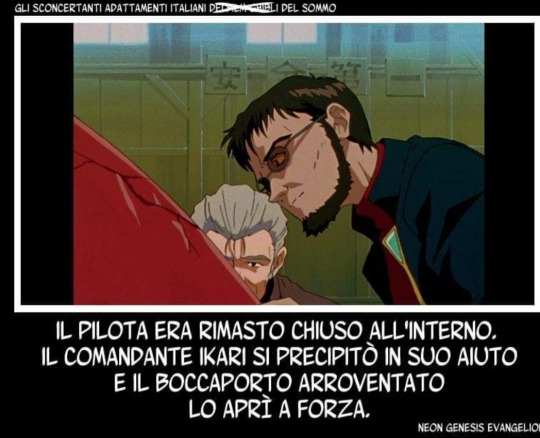
Explaination you can skip if not interested, but I thought this instance was too hilarious not to share with non-Italian speakers.
So: in his desperate attempt to sound educated via antiquated and uncommon linguistics, our adaptator used a 'dislocazione a sinistra' (dislocation to the left): a figure of speech in which a component of the phrase is put forward another that it would usually follow; in this case, complement+verb instead of verb+complement. This is helped by the complement pronoun 'lo', referred to the door. In English, the above phrase would be like saying: "The pilot had been locked inside. Commander Ikari rushed at her aid and, that scorching hatchway, he forcefully opened it". I'm quite satisfied of how clunky it is, it's a good adaptation of Cannarsi's usual quality of dubs.
Still, the problem is: 'dislocazione a sinistra' is pretty uncommon, and usually depending on the context to work. 'Lo' is a common masculine pronoun; in a language with gendered nouns, both 'hatchway' and, of course, 'Commander Ikari' are masculine. So, the most common way of reading the above phrase?
"The pilot had been locked inside. Commander Ikari rushed at her aid, and the scorching hatchway forcefully opened him".
End explaination.
Shinji is as shocked as we are to find out about this, with the added bonus of jealousy. He starts observing Rei, both when she's talking with his father (smiling?). And when she's at school, totally isolated from the other girls her age.
Then, during a dinner at Misato's place, Ritsuko asks Shinji to give Rei a new identification card, so he goes to her house. After knocking and not receiving any answer, he decides to enter (the door was unlocked) and finds out that Rei's apartment is a mess. Not the lively mess of Misato's house, but a dingy, dirty place, with no decoration or sign if personalization, bloodied bandages all around. The only item in there seem to be a pair of cracked glasses, which we know were Gendo's, he broke them while saving Rei. While Shinji is examining them, Rei shows up ... completely naked after having taken a shower. Shinji is embarassed to no end, but still manages to make the situation worse by losing his balance and falling down on the top of her, hand on her breast, scattering her lingerie all around. The whole time, Rei lacks any response beyond coldly telling him to move and asking why was he there. He tries to stammer an answer, but she leaves without letting him finish.
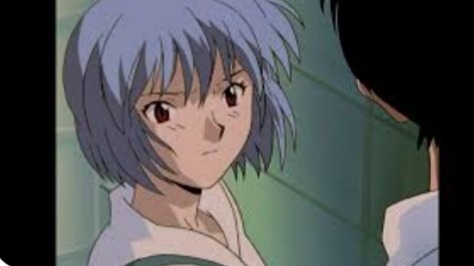
Shinji reaches up to her later and apologizes, then tries to ask her what does she think about her father. He lets himself slip that he doesn't have any trust in a father like that, and this is what causes Rei an emotional reaction: she slaps him, red with anger. Whatever further discussion is shot down by the arrival of the Fifth Angel.
NARRATIVE TECHNIQUES
Right at the start we have a flashback with a very unusual behavior by Gendo, which immediately piques our interest about what's going on with him and Rei.
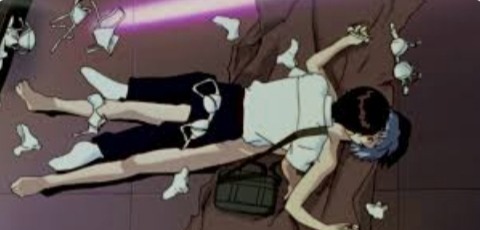
The most interesting part is likely Shinji's visit to Rei's apartment. It starts right off the bat subverting our expectations: the quiet and introverted girl is usually associated to a very precise and neat character, who is expected to live in a place with little personality but very clean and ordered; Rei's place is dirty and dark, a real mess. Then Rei herself shown up, and we are treated to another subversion. The scene is a combination of two hentai staples: guy accidentally walks on naked girl! Guy accidentally falls on girl, landing on top of her, with one hand coincidentally placed right on her breast! Shinji even accidentally draws out her lingerie drawer for good measure, leading to bras and panties falling around like snow. In any other anime, this would have been a comedic moment where the guy gets flustered, has a nosebleed, takes a ridiculously long time getting off the girl, and the girl gets comedically angry and hits him, calling him a pervert (sexual humiliation is fun!/s). Here the scene is played as incredibly unsettling. Shinji is extremely embarassed, but it's not played for comedy; he still takes a ridiculously long time getting off Rei, but this pause is not played for titillation, it's unnerving, with Rei's impassible fixed gaze on him and the music loud, repetitive, hammering. It's disturbing, why isn't he getting off her?! Because he likes it. When Rei finally demands that Shinji gets off her, it is with a neutral tone, barely annoyed if you squint. She keeps her composure for the whole scene, calmly getting dressed and asking why was he there. This in stark contrast with Shinji, who keeps stammering and getting distracted by a fast revolving cycle of sneaking a peek at Rei getting dressed, feeling guilty and averting the gaze, and then give into temptation again. She leaves without a word as soon as she's finished, without hearing the half-assed attempt at explaining. The whole scene has no music beside the hammering sound, furthering the sensation of alienation.
CHARACTERS
Shinji: he starts developing contrasting feelings for Rei. On the one hand, there is envy: he has been dismissed and ignored by his father all of his life, and when he finally gave him some attention, it was to throw him in a battle to the death on a robot he had never seen before. And yet Gendo gets to the point of burning his hands to save Rei from a simple test accident? Shinji doesn't get why such a different treatment for someone who is not even Gendo's relative, while he can get even the faint praise he wishes for so much. But this is complicated by the fact that he is also curious towards Rei herself: he doesn't know anything about her despite them being basically colleagues, she always looks so distant. This only furthers the questions he has about her and his father. Then, there is the attraction he has towards her. Sure, finding her naked and falling on her was an accident, but he did linger on top of her far more than it was necessary, and the way he flexed his hand, the hand which had fallen on her breast, indicates that he relished the sensation. Lastly, he is intimidated by her. For all the episide Rei has a sort of dominance over him: she is collected and indifferent while he is flustered and bothered, has no time for his lack of respect (yanks the glasses he stole out of his hand, leaves the room he intruded in as if he wasn't even there). This makes him nervous, but he still tries to strike conversation with her, on the topic of Gendo. It's interesting to notice that this is the most openly negative Shinji has been about his father with anyone else, angrily ranting about what a worthless father he is. Trying to alienate him to Rei, or to get some answers out of her about the relationship she has with him? The only answer he gets is a slap, and this shocks and confuses him even more.
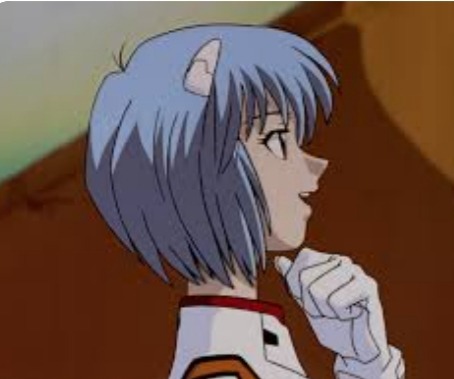
Rei: one of the most enigmatic character insofar. Literally: we find out from Ritsuko that for some reason, her whole past has been erased from documents. Moreover, her EVA is incredibly prone to acting out, something that has been attributed to a lack of connection due to Rei's 'instability'. Misato is surprised by this, she appears so calm! According to her classmates, she has never been closed to anyone at school, and she barely talks outside of EVA-related communications. What we can gauge of her personality is through her actions. We see that she ignores the mails she receives, and doesn't keep much of a clean house. This is still indicative of her detached relationship to others, but also indicates a detached relationship to her own self, as she doesn't take care of the place she lives in. Then there is the peculiar reaction she has when Shinji finds her naked, that is, complete disinterest. Now, Rei understands social norms about getting dressed: it's not like she prances around naked in public, Shinji intruded in her house while she was taking a shower. Rather, I suspect this indicates a lack of shame on her part, and frankly, why should she? Shinji is the one who intruded on her privacy, she is simply getting dressed. Should she feel humiliated and hide because someone went in uninvited? Hers is a pretty rational answer to the situation, all things considered. And then there is the slap. A lot less rational answer. So, she doesn't get angry to the point of attacking the other when Shinji breaks into her house and plays around with her personal belongings, but when he expresses his personal emotions about his father, she does? Shinji has a right to feel whatever he feels about Gendo. What's behind such a strong reaction? Does Rei feel a strong respect and devotion to Gendo? We know to little of her to do much more than speculate.
Gendo: maybe the most enigmatic character in this episode. On Rei, we can at least try to speculate, but Gendo? Why does he show so much concern for an unrelated girl, to the point of hurting himself, while he abandoned his own son and now treats him as a tool? No idea, at least for now.
Ritsuko: there are the first hints that she doesn't like Rei. She has a subtle glare in her direction, she doesn't want to interact with her (she would have had plenty of occasions to give her the new card, instead of delegating to Shinji). She says a pretty interesting thing about her: that she has difficulties 'at living'. Is she referring to Rei's lack of interaction with anyone but Gendo?

Misato: she doesn't have much of a role in this episode, being mostly in for comic relief.
Toji & Kensuke: they have a bit of a Greek chorus role here, commenting on Shinji's attraction to Rei and bringing up Rei's isolation.
THEMES
Here we really start to get going with the Freudian references. There's Shinji's complicated relationship with the father: he resents him for having abandoned and rejected him, but at the same time, that resentment is there because he wanted his attention and love, and gets jealous when someone else unexplicably gets it. And speaking of Rei: he is clearly sexually attracted to her, see the glances he kept stealing while she got dressed. So, he is sexually attracted to someone that his father, through his actions of care, claims as his own. Sure through, Rei is a girl his age, she's not his mother ...
SYMBOLISM

• Glasses: while he was rushing to make sure Rei was fine after EVA 00 malfunctioned, Gendo's glasses fell and cracked. Rei later collected them and kept them on her drawer. This is something that seems to imply an emotional connection between the two, but their further usage makes it more creepy. When he intrudes in Rei's house, Shinji finds the glasses and tries them: it is through the lenses that he sees Rei naked. So, by looking through Gendo's viewpoint, he sees this fourteen years old completely naked?
REFERENCES
Found none this episode.
And this is all for this episode. Thank you for reading so far!
If you liked my writing, you can support me by reblogging this or by offering me a coffee (link in first reblog).
#nge#neon genesis evangelion#nge meta#nge analysis#nge shinji#nge rei#nge ritsuko#nge gendo#cannarsi#tentative analyses#tentative analyses: neon genesis evangelion
58 notes
·
View notes
Photo

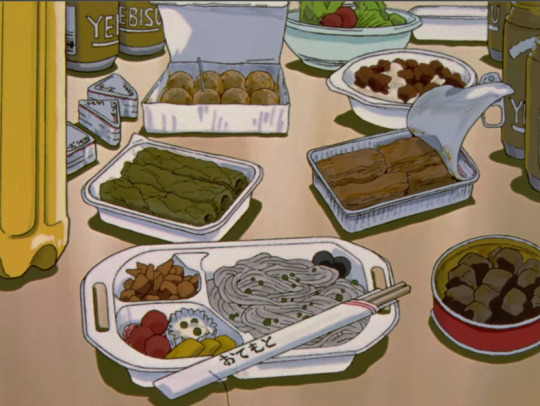
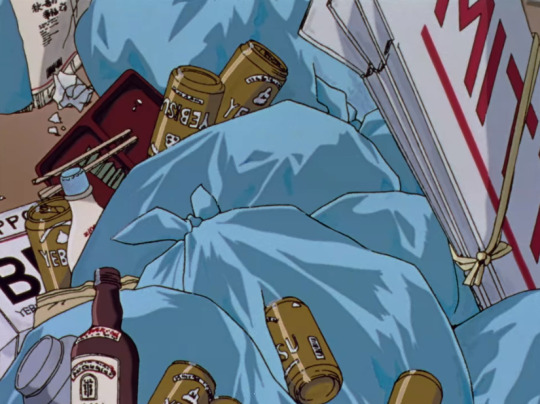
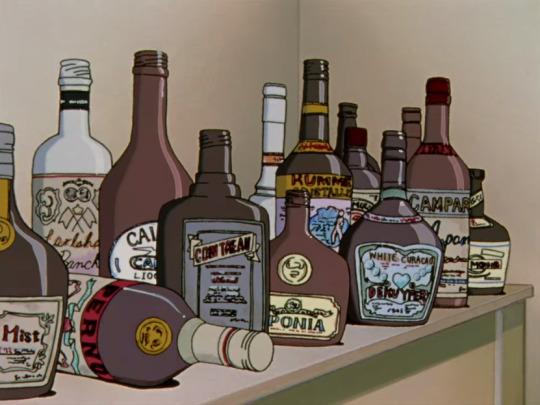
I love you cheap, store-bought anime food. I love you garbage. I love you grungy, grounded visual storytelling. I love you clear indicators of why even though Misato has good intentions she is so very not suited as a caregiver.
#pffft the rebuilds look good but there's a certain 'filthy' look to the cell art of the original series they don't/maybe can't recreate#neon genesis evangelion#evangelion#eva#nge#evangelion episode 2#anime scenery#anime food#visual storytelling#shinji ikari#misato katsuragi#evangelion meta#evangelion caps#eva caps#hideaki anno#art
968 notes
·
View notes
Text
Please keep in mind I don't know most of the ships/couples in the preliminary round. If you think something doesn't belong in this poll, vote that couple/ship out & please be civil!
For Kurogane and Fai:
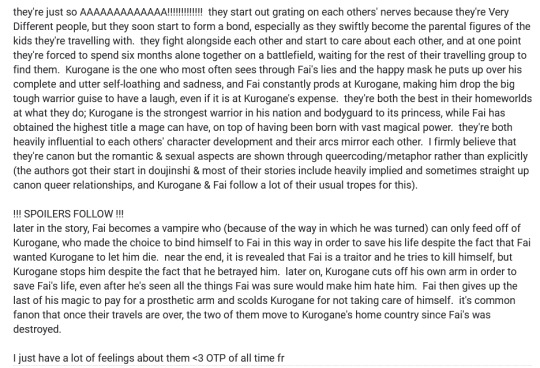
For Meta Knight and King Dedede:

For Snorpy and Chandlo:

#bqcb preliminaries#bugsnax#snorplo#queer as folk#kirby#meta knight#king dedede#nge#neon genesis evangelion#kawoshin#madohomu#madoka magica#tsubasa reservoir chronicle#kurofai
58 notes
·
View notes
Text
my friend and i were discussing how a lot of “fantasy” stories end up with our main group having to save the world, and how we think the whole character arc of answering the call is a little milquetoast, and we realized evangelion does that really well with the children. shinji cannot bring himself to answer the call, and only does so for peer pressure and approval, asuka isn’t so interested in saving the world as she is interested in being better at it than everyone else, and rei will just do whatever is asked of her. like yeah we’re saving the world but our intentions are far from noble
7 notes
·
View notes
Text
EVANGELION.
context: i just (as in, within an hour of beginning this post) finished watching evangelion, including both the tv series & the end of evangelion the movie. i have not read the manga, or watched any of the remake (?) movies yet (though i plan to shortly). my brain is thus running at like mach 10 rn trying to keep all of these thoughts in order, so to preserve these initial reflections while they're still fresh, here is the evangelion post. no worries if you're following me for other stuff, we'll be back to regular programming soon enough, but i can't let this shit stew on my own for much longer.
SUMMARY: 7 sections, on agency, sartre, shounen expectations, freud & generational trauma, queer shit, hope, & anime budgets. obvious spoiler warning.
1. agency (does shinji actually have any choices?)
this idea is one of the first to stand out to me while watching, and was also the most personally satisfying to watch develop since it only gained relevancy throughout the series + held major significance in EoE.
essentially: every single time that shinji has a "darkest hour" moment throughout the series, typically revolving around him not wanting to fight/kill/destroy/etc. while piloting the eva, someone around him will tell him that it is his decision whether or not he wants to continue fighting. most often this person is misato, though there is also an instance of kaji doing it in the later part of the show. significantly, while this "choice" is always framed as a decision that shinji himself is allowed to make, to join their forces and fight or not, it is very clearly not actually a decision at all- even ignoring the obvious...emotional stress of telling a 14 year old that he can either get back in the goddamn robot no matter how traumatizing it is to him and fight or single-handedly cause the extinction of humanity, shinji can never truly leave nerv and this only becomes more apparent the more time that passes.
that's all quite obvious in my mind, but what's notable here is the progression, both in terms of how the decision itself is presented to him, and how the continual fake-out of giving shinji any actual agency carves at his psyche.
in terms of the first, it is very clear, above all else, that shinji absolutely does not want to fight in the fuckign robot, which is demonstrated through the fact that every single time he is given the "choice" to leave, he takes it and runs away, no matter how dire the situation is. shinji does not want to be a shounen protagonist, dammit, but time and time again he is dragged back into the same position and, most importantly, taught that his choices mean nothing. from the first few episodes where he runs away from home, to EoE where misato drags him through a parking lot and throws him into an elevator while telling him to fight, time and time again shinji's agency is violently taken away from him in the name of the continuation? transformation? of humanity, and i think that from his complete lack of desire to do literally anything in EoE we can tell he is aware of this.
what's really significant about all of this, then, is the way that this message influences the few instances where shinji actually does have some semblance of agency. in particular, i'm thinking about the gay angel (THE GAY ANGEL) and the ending of EoE.
so, first: the gay angel. kaworu. i say "semblance of agency," since shinji is kind of just given the same decision here as everywhere else, but this one is presented pretty & executed (ouch) pretty differently so i wanna talk about it.
kaworu is a very different character from everyone else in the cast for the primary reason that he is not particularly caught up in his own bullshit. he shows up at a time when shinji basically has no one (the trust "darkest hour" of the whole series, really) and is notable in that he openly and easily gives him love and time when no one else is really able to. this could in part be attributed to his status as an angel, but i think it goes further too- more on this in the section about generational trauma.
anyways, the decision to kill kaworu is phrased very differently from the previous "choices" offered to shinji by misato. rather than telling shinji that he has a choice in the same vague terms as before, to fight or not fight, kaworu kinda just tells him straight up- either he can kill kaworu, the one person who mutually loves and cared for him at a time when literally no one else was able to and thereby give humanity a chance at continuation, or he can hold off and let kaworu live but cause the destruction he has been pulled into staving off for the entire series. loneliness or annihilation- those are shinji's two choices here, and kaworu is very open about which one he prefers, citing the good that humanity has brought forward. i actually think that misato is wrong in her interpretation of this scene (lots of misato slander here whoops, i swear i love her)- kaworu isn't offering up his life here out of a lack of care for himself, but rather an overwhelming care for shinji as an individual and humanity as a collective.
from shinji's perspective though, this is basically the same agonizing moral dilemma he has been forced to "decide" for the last 16 angels, and he knows by this point what the answer is supposed to be. it's what's so truly tragic about this moment to me- even if kaworu meant this to be a genuine decision for shinji to make, accepting the consequences of his choice fully either way, shinji was never going to be able to see it that way after having the "correct" answer forced upon him again and again. he might be able to scramble for a justification in the aftermath, rationalizing it as his own (supposedly) disgusting need for validation, but he was never actually allowed to decide any other way and he knows it. even if shinji would ultimately choose in favor of the continuation of humanity & continue fighting, the decision itself is so tainted* by this point that it doesn't really matter, since no one could ever really know the truth.
*(this lack of a decision could also be attributed to an inability for anyone to truly trust shinji- see section 2 on sartre for more on this dissonance.)
there is, however, one instance where shinji truly is given an actual choice, which coincidentally also includes kaworu but also rei at the end of EoE. here the choice is a bit different though, instead being between the continuation of humanity in its collective, gelatinous blob state or broken back up into separate entities.
since humanity has already been eradicated (hey callback to kaworu's presence marking the ultimate end of humanity, he came back for more than just to comfort shinji & be a thematic parallel to denote his "true" choices), i think shinji is able to view this decision much more clearly and thus seems a lot more satisfied with his ultimate choice. there's a lot of nuances to this of course, as evidenced by the ending with asuka, but past that i think the fact that both the tv series & EoE end with shinji coming to some sort of satisfied (if mostly theoretical) conclusion that seems to leave him with a marginally happier emotional state is pretty meaningful, especially considering just how little emotional development these characters go through in general (see sections 3 & 4).
what's particularly satisfying about all this though is the fact that shinji seems to actually engage with this idea himself in one of previously mentioned conclusions. the ending of the tv show is essentially just shinji realizing that he does in fact have agency and has had it all along, even if not in the biggest/most overwhelming situations he was forced into. personally, i read this as shinji not only becoming consciously aware of his own learned helplessness, but also the fact that he has actually been making decisions for himself all along and is able to continue doing so, that he can take back his agency for himself through the conscious decision to keep making meaningful connections with others- a very beauvoirean conclusion, which is gonna become real significant real fast as we get into this next section. up next: sartre.
2. sartre (shinji/asuka/rei as no exit, ft. good place parallels)
no exit is a 1944 existentialist play written by the french philosopher jean-paul sartre. in it, three people (two women, & one man, by the names of estelle, inez, and garcin) are sent to hell and locked in a room together, destined to torture one another for the rest of eternity. the most well known line from it is likely "Hell is other people," a conclusion the character garcin comes to near the end of the play as the group realizes the truth of their circumstances.
there are some obvious connections here- the three main characters from no exit pretty easily map onto the three main pilots (estelle -> asuka, garcin -> shinji, and more lightly inez -> rei). the cycle of torture even follows as well, with a possible interpretation of the pilots' dynamic being that asuka tortures shinji (see section 5; tldr it's all the degradation), rei tortures asuka (her silence heightening asuka's insecurities), and shinji tortures rei (less obvious, but hinted at through things like rei's emotional attachment to shinji which seems to at least scare her for how strange it is).
past that though, the sartrean elements of this story become super fucking clear in the last few episodes, coming down to two big ideas that shinji frets over: freedom as a curse, and hell as other people.
the "condemnation of freedom," idea is kind of tied up with the whole shinji agency thing discussed in section 1, and since i don't think i can elaborate on it much more here without doing a whole deep dive on the philosophy, i'll just focus on the second idea, especially since it's one of the emotional cores that the story revolves around.
the idea that "hell is other people," as stated by garcin in the original play really comes down to one main factor and that is the dissonance between how we view ourselves & how other people view us. in the show, this is presented through the hedgehog allegory (also related to western philosophy but i know sartre better so i'm gonna keep talking about him here) and the idea that in the process of getting closer to one another we also hurt each other more, but i think the sartrean idea lends a bit more light onto the whole conflict of perspectives thing that the hedgehog idea along misses out on.
it's pretty clear imo that shinji has some kind of social anxiety, or at the very least is dealing with a lot of the normal anxiety that comes with growing up and beginning to desire validation (from your peers, from your guardians, etc.). the entire point of EoE as a film and seemingly the very basis for the concept of AT fields is the idea that humanity is separate, with individual humans never being able to truly connect with one another. ignoring the more esoteric & absurd ways this is portrayed in-movie, this idea is pretty easy to get on board with- relationships change over time, people fight and become close and fall apart, and that is largely just a natural fact of life. again, the inability to accept this fact is going to be examined more in section 4, but i think shinji is key in connecting the hedgehog thing to sartre.
near the end of EoE, when everyone is getting exploded into orange goop and melted into the human soup, it is notable that the way everyone gets incorporated is by a rei transforming into the person that they seem to have wanted to connect with the most (shinji's dad with his mom, but also maya w/ akagi and hyuga w/ misato), again tying back to that theme of desiring a more "true"/deeper connection between people. at the end of the tv series, however, this is slightly different due to the look we get into shinji's mind. specifically, shinji doesn't just desire a relationship (platonic, romantic, and/or sexual) or validation from other people, but is caught up in the way that he is perceived by others. the separation between people is thus torturous to him not in how it means he can't truly connect with other people, but in how he can't control the ways that other people view or understand or react to him.
i think this is a part of why shinji seems to have a much easier time with his end decision in EoE- despite all the underlying freudian psychosexual development shit that permeates through some of the weirder parts of NGE, shinji seems to me to care a lot more about how other people view him than the specific types of connections he is able to make, e.g. he still considers his relationship with asuka to be a key point of meaning in his life, despite how turbulent/messy it is. for a kid who struggled with social interactions a lot growing up, any deeper connection is pretty meaningful to him by this point, and it shows. this also could be attributed to being a part of the greater influence of kaworu, as the fact that he cared so deeply and so meaningfully about shinji (and the opposite as well) may have been proof to him that any "deeper" connections aren't really necessary or worthwhile, even before he got mixed up into the people soup.*
*ALSO: didn't think about this until later, but there's also the whole process of connecting with the evas that the pilots have to go through to think about here.
**ALSO 2: if you didn't already know, the good place is also very overtly based on no exit. this means there's actually a kinda random parallel between tgp & evangelion in that they both happen to add a fourth individual through the introduction of a fourth dude (jason & kaworu respectively) that mixes shit up even more. neat.
so, speaking of the various endings:
3. the ending does make some sense, actually (dropping shounen expectations)
one of the things that i was most impressed by while watching evangelion, especially around the mid-point of the tv series around the time that asuka is introduced, is the fact that they were able to make what would otherwise be pretty standard anime fan service a genuinely meaningful part of the story's underlying themes, in particular those related to the freud shit (getting there soon, i promise) but also just the general connections to biology and humanity and development.
i don't think evangelion should be watched or understood like a traditional shounen show, and in fact it kind of goes against the underlying emotional core of story to try and force that kind of reading onto it. like, okay, take shinji for example- like i said a couple sections back, one of shinji's key character traits is the fact that he doesn't want to be a fucking shounen protagonist and hates being forced into that position, but keeps getting dragged back to nerv and EVA 01 anyway.
i think it's notable that the few moments where shinji has what might be considered a "traditional" epic shounen hero moment could very easily be read as not even being shinji's own actions in the first place, but the eva itself due to them 1. not showing shinji's face during the moment, just his fear before and trauma after, and 2. being motivated by shinji's extreme fear, giving more of the vibe of a mother protecting her child than shinji making progress on his own.
none of the main cast really seem to go through any super significant character development throughout the entirety of both the show and movie, actually- the closest we get is whatever the hell rei was doing and the breakthroughs in thought that shinji has at the very very end of either production, but that's about it.
what i think makes this important is the fact that it points towards what the actual emotional core that the show centers around. what sets evangelion apart from other shounen shows, imo, is the fact that it takes a hard look at the apocalyptic world that it created and really takes the time to reflect on how that kind of trauma would actually influence its characters. i haven't seen a ton of in-depth negative reviews of the ending of NGE, but i'm guessing that a major factor in the potential frustration with the ending is the fact that it drops a lot of the overt plot elements in favor of more a more abstract look into shinji's mind. but i think that look is entirely the point of the ending- it was never really about the robots, or at least not by the end of the series, so the ending focuses on the emotional payoff of at least one character instead to find the barest glimmer of hope leftover.
this is part of why i find kaworu to be such a significant character- one of the key conclusions that shinji seems to come to at the end of the tv series is the idea that "you have to love yourself in order to love other people," but i actually don't know if that's entirely true or even demonstrated in the series. kaworu is the first person to really demonstrate to shinji that he is capable of loving and being loved, and despite the tragedy of that relationship, i think it was a core part of shinji's eventual first step towards self-acceptance.
4. freud & generational trauma (everyone is ultimately just an abused child)
ok fuck it, i've been talking about this for ages, let's just fucking get to it already.
i'm nowhere near an expert on freud, really i only have a pretty baseline understanding (thanks to a high school ap psych class) of the psychosexual stages of development thing that the show references a lot in the later parts (the oral fixation thing w/ misato, etc.), so rather than looking into the details of that, i think the big thing here for me is how the use of freud influences the ideas that the show focuses on. namely, as we see through the last few episodes of the tv series: everyone is just a sad, traumatized, abused kid.
i also think that what the inclusion of all the freud shit ultimately does for this series is give it a big emphasis on biological human development and family relations, which feels especially significant in how it can tie into a more subtle, but imo still very important idea: generational trauma, told through the story of the end of the world.
what i like about this idea is that it's really where the story begins, chronologically in the timeline and in episode 1 with shinji & gendo. the idea then evolves and expands the more parent/child relationships we learn about, from misato and her father to asuka, akagi, and, at least in part, rei.
similar to how the series utilizes its religious themes & imagery to get back to the origins/sources of humanity (namely adam & lilith), i like to think of the second impact as the source of this initial trauma. because of the second impact, we are basically guaranteed that every single adult present in the series has dealt with some degree of trauma, though in many cases this expands to other things as well (e.g. gendo struggling with social connections & misato's tricky relationship with her father, both of which are established pre-impact).
what's really big though is how this initial trauma influences the next generation of kids, especially the main trio of eva pilots (& their respective mother-related machinery) but really all of their classmates as well. toji, to some degree kensuke, really every kid born after or around the time of the second impact seems to similarly deal with the echoes of this initial trauma. if you want to, you could maybe even relate back to the very first impact of the lilith egg as a source as well, each new impact being an echo of the previous through the continuation of generational traumas.
TLDR: the freud shit doesn't have to just be freud shit, the fucked up family relations can be read through the lens of generational trauma as well.
5. queer shit (THE GAY ANGEL)
when i say queer shit here i'm really talking about gender roles, which is ESPECIALLY important when talking about shinji's two main crushes: kaworu and asuka (sticking with those two for now since they're the most overt, but they're not necessarily the only ones you can read into btw).
the big thing here is that imo the main factor that makes shinji's relationship with asuka (in particular, but really all of the women in the show) so difficult is the weight that heterosexual relationships have. again, much of evangelion's imagery is heavily focused on biology, specifically in terms of development both as a baby is developed & in puberty, and i think that weight is felt in the awkward relationships shinji has with all the girls he's suddenly been surrounded by.
this is in part why i think it was so much easier for shinji to get on board with kaworu, and why the relationship itself was so meaningful to him- because there's no threat of MARRY A WOMAN BONE HAVE A CHILD REPRODUCE CONTINUE THE HUMAN RACE (the last one in particular being especially relevant in the post-apocalyptic hellscape they're all trapped in), shinji is able to focus entirely on the personal emotional aspects of the relationship and the ability to find meaning through human connection, which again is a very beauvoirean idea.*
*i think i kinda skipped over this in the sartre section but beauvoir was a contemporary of sartre that influenced a lot of his philosophy especially later on so the fact that shinji's end conclusion seems so reminiscent of beauvoir is very satisfying.
this is not to say that shinji's relationship with asuka or any of the women around him wasn't meaningful or revolving around genuine feelings on his part, just that the weight of social expectations particularly in the context of male/female gender roles is a constant factor at the back of his mind when trying to navigate all these new social situations.
this is also not just an issue that shinji deals with- asuka herself is constantly the one to call shinji out for not being enough of a real man, which shinji actually rarely mentions all that directly, only caring when asuka herself mentions it, and i personally read her struggles with sexuality and desire to be seen as an adult as a part of her deeper issues with the woman gender role. misato kind of deals with the same thing actually, and even akagi in how they all have such tricky relationships with their own sexuality and the men around them. again, i think the whole dissonance between differing perceptions idea is relevant here, especially when considering the ways that women deal with objectification, both in terms of how others view them and how they're taught to present themselves.
6. no development but lasting hope? (making sense of EoE)
i kind of already talked about this, but expanding on the idea that everyone is ultimately still just an abused kid looking for solutions to the problems they were raised to have, i think it's significant within the imagery of the show that the world post-second impact is eternally spring/summer, meaning that even the environment the characters are trapped in itself is unable to develop or grow, stuck in the same cycle of infancy & puberty with no real adulthood. the constant threat of the angels and/or third impact also adds to this, with characters rushing to get married and form relationships (as misato & akagi talk about in one episode) but never getting the chance to properly grow old before they die.
this implies however that the existence of an autumn/winter is potentially in the future, that growth can come eventually and hope is still present. i'm not entirely sure yet what to make of the ending of EoE- i actually really like how the tone shifts so drastically immediately following such an emotionally heavy, complicated sequence, but i also don't think it's entirely without hope. it's the same old as before, maybe a relapse, maybe a reaction the traumas that initially happened, but. i mean she doesn't actually die??? my big conclusion is still a work in progress i suppose.
7. bonus: this isn't low budget it's goddamn beautiful, watch utena
i've been writing this "short reflection" for like two days straight already, this section is basically just the title. watch utena for more fucked up shit with an actually low budget. frankly this video explains the low budget thing better and has a better justification so i'll just direct you there. (yes this connection is about the therapy elevators.)
#astronaut rambles#nge#neon genesis evangelion#end of evangelion#evangelion meta#not my usual type of meta posting but i couldn't keep this shit in#sorry if the freud section is kind of incoherent i stopped & started writing halfway through it due to a need to Sleep#baz this one's for you
35 notes
·
View notes
Text
here’s a revelation for you, if shinji ikari and homura akemi swapped stories and scenarios they would respectively be totally okay:
if shinji was faced with walpurgisnacht and the time loop he simply wouldn’t have the stubborn dedication/insanity homura does to keep trying it, he would eventually break down and formulate a plan that could actually beat walpurgis (rather than just keep trying to do it himself)
and if homura was the third child her comparative hard-skinnedness would make basically all of shinji’s tragedy checklist items easily skippable, and she would absolutely rebel at a gendo-like figure in a productive way
and this is an interesting look into how tragedies work and all but just imagining this role swap is giving me whiplash, and now i have to inflict it on you
#neon genesis evangelion#evangelion#nge#puella magi madoka magica#pmmm#shinji ikari#homura akemi#meta analysis#horrifying observations series#part iv#i think
131 notes
·
View notes
Text
Asuka constantly projects her abandonment issues / desire to be competent. she tells Shinji he’s been ‘replaced by the new model’, like how she was “replaced” by a doll. Tells her eva to do what she says, just obey her. like how she was willing to do whatever her mother said. screams ‘you’re just a doll’ at rei. screams ‘you’d die if he ordered you to’. like how she wanted to die with her mother.
49 notes
·
View notes
Text

all the mystery and terms that are just dropped around and youre waiting for some reveal or something... until half of it is never expalined and half is just dumped in exposition episodes by the scientist Ritsuko.
the first impact is literally never explained in the main series or end of eva, i stumbled upon it on the internet.
kaworu, a fan favourite character that youve been lead to believe has a very deep and impactful relationship with shinji... literally only appears for 20 min before he dies.
tge scene where his toji gets roped into being a pilot and gets stuck in a berserk eva is one of those occasions where you actually feel dread for the characters. when shinjis eva is literally ripping the other eva apart and crushing the entry plug in half with his friend inside and all he can do is watch...and thats when he thinks its just a human inside. thrn he finds out it was toji, his friend.. its genuinely horrifying, its shocking.
and then he somehow survives. it kind of ruins the impact
though in defense rei surviving wasnt really impractical because she did die..they just got a third clone to replace her and made it look like she survived.
and the last two episodes...a beast of their own. i liked the abstract animation and the various techniques used to represent the mental state of the characters. but they explain jackshit.
after kaji dies you really have no idea whats going on with the plot anymore. they show you shinjis mind but you dont know whats happening with the characters outside. and it ends like that, shinji accepts his existence and everybody congratulates him and its very wholesome but youre clueless as to what actually happened to the characters.
then it turns out youll have to watch end of evangelion for that, which again is superbly animated, the visuals are intense and haunting, the aesthetics are on point but nothings really explained.
i could really only get through the whole thing because i the overarching themes, the soundtrack, i.e. the creative choices, the artistic liberty resonated with my taste. its kind of impossible to get through it otherwise.
but you have to say certain parts are very well made. like asukas deterioration arc. very superbly put together for maximum horror.
the starting episodes are very structurally similar. repetitive. an angel attacks about quarterway through, they fight, fail, devise a plan, fight, win etc. with one or two variations thrown in. the angel possessed an eva, is capable of hacking into the magi, it sucked shinji in, it can split apart etc. even the animation sequence felt identical, alarms would blare, a repeated voice announcing an angel sighting, code blue, megaphones blaring for citizens to go into lockdown, an animation sequence of gates inside nerv locking down with red alarms as a background. ritsuko orders maya to analyze something, misato asks where shinji asuka and rei are etc. i liked that though. it was very...simple. combined with the 90s art style and the slice of life parts it gave it a certain charm.
evangelion is not very strong on plot. its not very clear and well planned out, and budgets and censorship and deviation from the manga make it kind of incomprehensible. as a whole its not very coherent, more to do with aesthetics and cool soundtracks and what looks the best just thrown in.
it endeavours to deconstruct the human psyche and the mecha and religous symbolism is just a way to get there. the daddy issues, the dead mothers and the psychological repression and denial can get a tad repetitive. and yeah...the characters never really mature. But personally their immaturity is what i like about them, i dont find them that irritating or unbearable and instead seem like relaistic tennagers with Issues tm.
this is just for the anime series though, which is very different from the manga. the anime is the original and more well known though, so much that fans only mention it and the rebuild movies in discussions. im reading the manga and i like it so far, its also supposed to flesh out characters like rei a bit more.
no lies this is actually a pretty good analysis. even if he hated eva all his points are valid and he did his research. anyways ill make a post about the parts i liked soon
12 notes
·
View notes
Text
TENTATIVE ANALYSES: NEON GENESIS EVANGELION
Episode 3: The Phone That Doesn't Ring/ A Transfer
NARRATIVE STRUCTURE
This chapter follows the simple structure of Introduction - Rising Action - Climax - Falling Action.
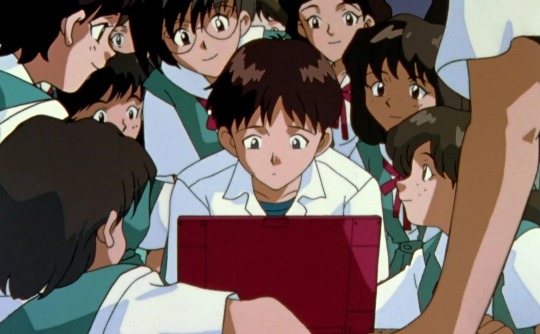
1. Shinji's New Normal: we open on Shinji doing a combat simulation on his EVA; he performs well, but he's apathetic, just going with the motions. Misato is concerned about this, along with the fact that he hasn't made any friend at school. In fact, the following day, Shinji makes an outright enemy: a guy whose sister was severely injured during Unit 01's fight against Sachiel, and finds out along the whole class that Shinji was the pilot. This guy, Toji, retaliates by punching Shinji once for this, and once again for protesting that he doesn't pilot because he wants to.
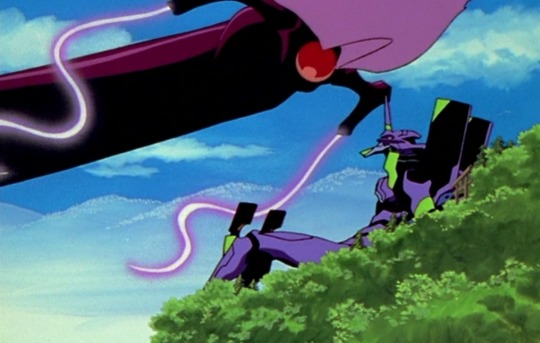
2. Angel Attack: another angel, Shamshel, appears, and Shinji is deployed to fight against it as Rei is still too wounded. Kensuke, Toji's friend, has the brilliant idea of sneaking out to film the event, and the other reluctantly follows him. Predictably, they find themselves in the middle of the fight, and Shinji has to take critical damage to shield them and allow them into the cockpit.
3. Shinji's Berserk: now, Shinji finds himself with the EVA damaged and about to shut down, and in stark contrast to his mechanical shooting in the simulation, he starts crying and wildly attacking Shamshel, piercing him repeatedly in a brutal fight; he manages to kill him just a second before Unit 01 shuts down, and then he breaks down completely.
4. A New Perspective: Kensuke and Toji return to school, but Shinji, for the moment, doesn't. Toji is about to call him to check on him, but then decides against it.
NARRATIVE TECHNIQUES
There is a chiastic structure across this episode and the previous two. Toji's problems with Shinji initiate when his sister is injured in the fight against Sachiel, now he himself is directly involved in that against Shamshel and is protected by Shinji. The telephone also serves this purpose: at the beginning, Misato worries that nobody is calling Shinji, at the end of the episode Toji was about to but ultimately doesn't. One situation is subverted, the other stays identical to itself.
CHARACTERS
Shinji is traumatized. There's no other word to describe his behaviour. During the fight simulation, it's painfully obvious that despite his appearently good performance, he's just going mechanically, and he tries doing so in the actual fight against Samshel, too, despite the situation calling for a different course of action. When it turns out that he cannot go on like that, he has a breakdown and starts acting recklessly, beating down the Angel in a screaming fit of pure will to survive. Then he finally breaks down crying, unable to hide his trauma anymore.
And the thing is ... he has nobody to comfort him. Misato's words about everyone being grateful to him were just proven false, at least in part: for all the interested girls Shinji gains when he reveals that he's the pilot, there's Toji, whose sister was collateral damage in the Sachiel fight and can't wait to take his hurt and pain out on the responsible. Even at the end, when he has witnessed just how hard it is to fight against Angels, he doesn't call Shinji to make his concern known to him.
Misato here acts like a parental figure for Shinji, worrying for the fact that despite having given him the phone so he could talk with his friends, he still hasn't received any call. Beyond that, she establishes herself as the one more concerned with the casualties, being the one to order Shinji to let Toji and Kensuke inside the Eva to protect them against Shamshel.
Ritsuko foils Misato on the above point, being the one to protest that Shinji must focus on the fight and the civilian boys have no place there. But she's also the one to whom Misato voices her concerns, and answers with the famous Hedgehog dilemma (we'll discuss it in another section).
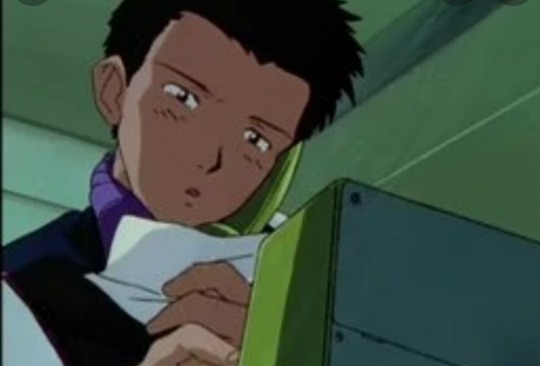
Toji presents himself as an hothead, stuck within the idea of presenting himself as super tough and masculine. While his grievances about his sister may have had a basis (even if the responsibility for not evacuating properly falls on the authorities and not on Shinji, who was tossed into battle extremely unprepared) he chose to physically attack him instead of arguing, not even letting the other say his explainations. When Shinji does so anyway, saying that he's not a pilot because he wants to, Toji takes his answer as a deflection of responsibility and thus of weakness, and beats him again to show his contempt. But this bites him when he gets tossed in the middle of the fight with another Angel, and has to realize exactly what kind of gruelling, dangerous work it is and the impact it has on the pilot. But if this triggers a change of heart, it doesn't prompt him to change his general attitude: despite actually wanting to check on Shinji, he ultimately decides against it, because expressing feelings is not manly.
Kensuke is more chill and laid-back, but also more uncaring: he gets himself and Toji in the middle of a dangerous fight zone just to film it, and then, despite telling Toji to do so if he wants, doesn't even try to call Shinji.
Rei continues being in the background: she's still bandaged, but healed enough to return to school; she observes Shinji's drama, but doesn't intervene in any way.
THEMES
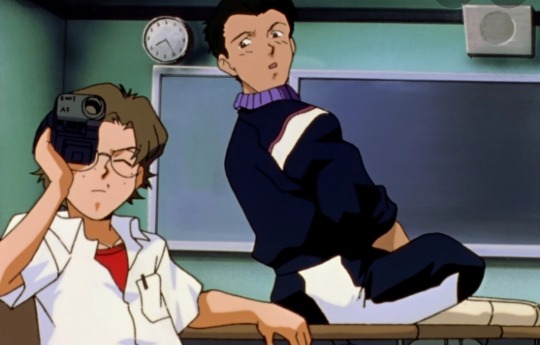
This is the chapter that formally introduces the Hedgehog dilemma that will be so important for the series as a whole. This dilemma, formulated in the real world by philosopher Arthur Schopenhauer, is here exposed by Ritsuko: two hedgehogs wanted to keep each other warm in the winter by sharing their body heat, but when they got too close to each other, their needles kept hurting one another. So they were stuck trying to find an ideal distance that kept them warm enough and at the same time didn't get them hurt. This story is told in response to Misato's worries about Shinji's social isolation, but is exposed in the episode by the lack of communication that permeates it. Both Toji and Shinji fail to properly communicate: the first expresses himself through his punches, first for a stated reason (the injured sister) and then for one that's left to interpretation, likely the fact that he found Shinji's excuse weak. On Shinji's side, he can't manage to assertively defend himself: all he can do is mutter that he's not doing that work because he wants to, without stronger arguments like the fact that he was coerced into the cockpit with absolutely zero preparation and with the barest instructions, in a desperate and extremely brutal fight. At the end of the episode, Toji does change hismind due to witnessing firsthand how dangerous fighting the Angels is, and is actually concerned for Shinji's wellbeing; but still, due to the aforementioned toxic masculinity, he decides against expressing his feelings and closes the call he sent before Shinji can answer.
SYMBOLS
• The Phone: Misato gives Shinji one to encourage him to develope a social life, but is the first to notice the failure of the plan: Shinji's phone never rings, and she fears that he hasn't made any friends. She's right; but at the end of the episode, there is someone who would like to call Shinji ... but decides against it. Shinji's phone never rings. It ends up being a symbol of the Hedgehog Dilemma, the failure of Shinji of really communicating his trauma of the Angel attack and of Toji in expressing 'soft' emotions like understanding and concern.
REFERENCES
• The Hedgehog Dilemma: a metaphor first conceived by Arthur Schopenhauer in Parerga et Paralipomena (as Ritsuko helpfully explains) to reflect on the challenges of human intimacy. Two hedgehogs move close to share heat during the winter, but end up hurting each other with their spines. This metaphor was later borrowed by Sigmund Freud in Group Psychology and the Analysis of the Ego to illustrate the 'sediment of feelings of aversion and hostility' in any long-lasting human relationship.
Thanks to anyone who bothered reading so far. If you liked my analysis and want to support me, you can do it by reblogging this or offering me a coffee (link in first reblog). Thank you!
#nge#neon genesis evangelion#nge meta#nge analysis#nge shinji#nge misato#nge toji#nge kensuke#nge ritsuko#tentative analyses#tentative analyses: neon genesis evangelion
30 notes
·
View notes
Text
Anime I Judged too Early
I got this idea from user @ avvviso!
Here are some anime I ended up really liking despite being skeptical/judgmental of them before watching. Let’s get started!
Spy x Family

This might be a shocking first choice because so many people have been raving about this show recently, but due to all the hype I was skeptical that it was just another overrated comedy that had no substance. I was totally proven wrong by the first episode, it really is a sweet funny show that has good characters and an interesting plot. I don’t think it’s the best anime of all time but it’s definitely worth a watch if you enjoy light, cute comedies with a fun concept.
Dr. Stone
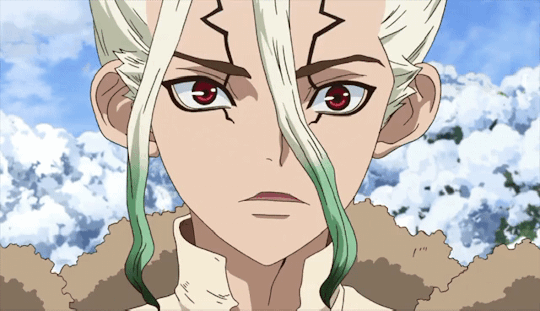
I had a friend recommend this show to me years ago, and I was pretty hesitant to try it because I don’t really care for isekai (which this show... technically is?) plus I am not a big science person, but after watching a few episodes I really appreciated how interesting and funny the show is, even if you don’t care for science. I genuinely learned a lot and I was on the edge of my seat. (I was also judging the character designs pretty hard but you get used to it/even grow to like them)
Haikyuu!!
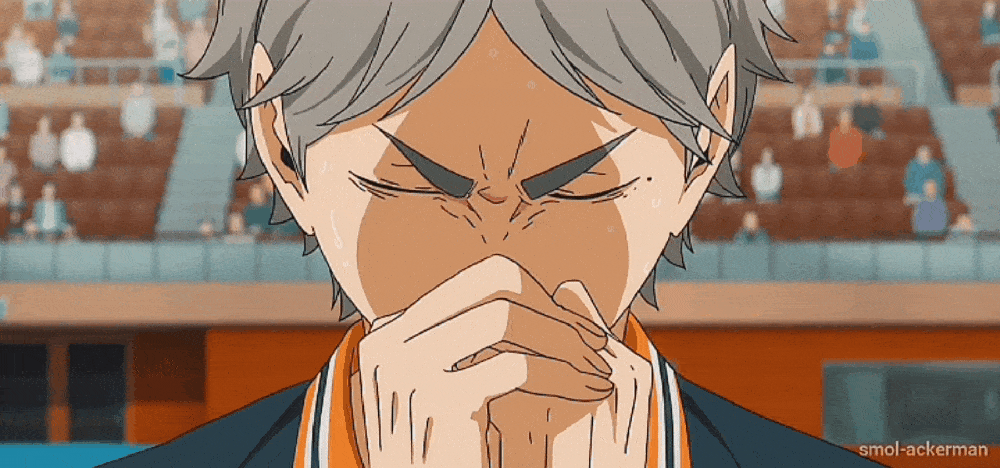
So for years online, all I saw about this show was a looooot of ship content. Which is fine, it’s just not my cup of tea and gave me the false impression that the show wouldn’t have a strong plot. This is my bad for judging a show from its online presence, but I was very pleasantly surprised when I actually gave it a shot and realized how emotional and deep the stories in Haikyuu actually were. And yes, even though I don’t usually ship stuff, after watching the show I understand where the most popular ships are coming from and why they’re so beloved. But the show has a lot more facets to it that I didn’t know about.
Madoka Magica

I had been fortunate enough to avoid any spoilers about Madoka Magica for years, but because of that I almost had the opposite problem where I had actually no clue what it was about and genuinely thought it was some cute Sailor Moon type anime or something. I had no idea that in reality it was a very dark, surrealist show that was entirely up my alley. I really am glad I gave it a chance, because it’s in my top 10 anime of all time now.
Neon Genesis Evangelion
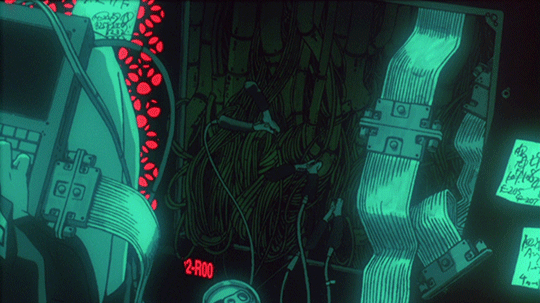
I’ve said before on this blog that I am not a mecha anime person, and since that was all I knew about Evangelion, for years I was like yeah no thanks. I didn’t know that it was intended to be a subversion of that genre until I had so many friends recommending it that I couldn’t take it anymore and just gave it a shot. I wouldn’t say this is one of my favorite anime ever or one I even love a lot, but I appreciate what it’s trying to do thematically and I definitely misjudged what the show would actually be about.
As a counterpoint to this post, there have been tons of shows where I pre-judged them and was completely right, but imo all shows are worth a try, even if that try is only watching 15 minutes of the pilot.
I know some people have a 3 episode rule; for me, if I can’t make it through the first episode I generally will just give up, but if I can do that much I will push through to 2 and by then I’ll know if I want to continue the show or not. Just in case people were curious about my process.
Anyway, thanks for reading! And thanks again to avvviso for the idea.
-threecheersforinking
#anime#anime review blog#anime review#spy x family#dr. stone#haikyuu#madoka magica#evangelion#nge#neon genesis evangelion#anime recs#anime recommendation#anime meta
15 notes
·
View notes
Text
Headcanon / meta: Post - End of Evangelion.

( Note: this will be primarily focusing on the anime, but I will make mentions of the manga as I’ve pulled some influence from it. )
So after End of Evangelion, Tokyo-3 is ruined in the aftermath of the Third Impact. Most of it was destroyed in the conflict with the JSSDF, and whatever wasn’t was destroyed when Lilith raised the Black Moon. What the hell is everyone supposed to do after that?
As Yui mentioned at the tail end of Instrumentality, “anyone can come back as long as they have the will to live.” So not everyone is permanently tanged, but pretty much all of humanity is merged into the LCL sea and people will return to their physical bodies one-by-one should they have the desire to do so.
As far as wreckage goes, obviously Tokyo-3 was completely decimated, but in entering Instrumentality, people left their physical forms. If humanity was supposed to be brought to a state similar to the First Ancestral Race — in other words, closer to perfection — they may have left this plane of existence, ascending to a higher one ( thank you Cherry for helping me with this bit ). That said, beyond the Black Moon rising out of the earth and destroying Tokyo-3, the physical damage to the rest of the world should actually be quite minimal. The skies might appear red for a while, the oceans would take on the same color, the Mass Production EVAs would stand in their crucified positions, and obviously everything would be really empty with everyone merged into the LCL sea. But otherwise, things would be relatively unchanged outside of Tokyo-3, which serves as the epicenter of it all.
If anything, in the manga, we see a return of seasons:
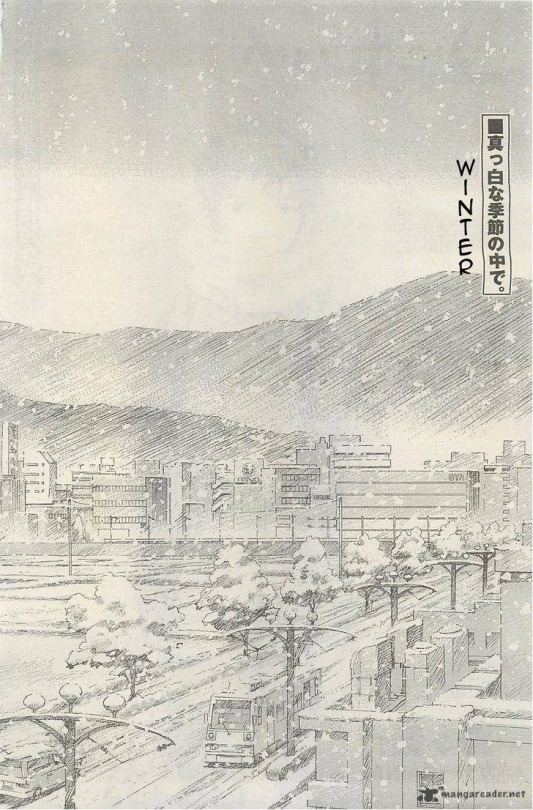
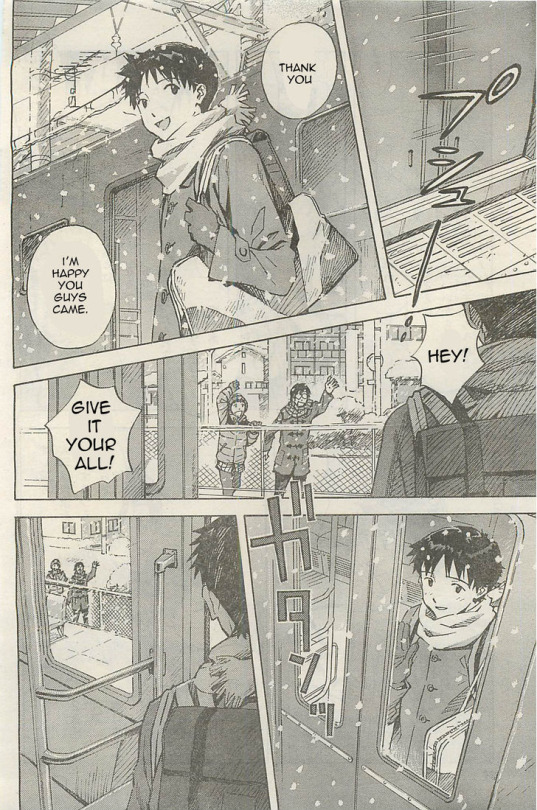
Plus in the manga, Yui mentioned wanting Shinji to see a change in seasons one day, since they were lost to climate change in the Second Impact! So if any huge worldwide change was going to take place, I’d like to imagine that Yui, in her godlike state as Unit-01, willed them to come back.
Anyway, returning to the idea of wreckage, people coming back to Tokyo-3 from Instrumentality ( presumably NERV faculty first ) could move to other parts of Japan and gradually get back on their feet. This is what I imagine Asuka, Shinji, and anyone else who wasn’t dead before Instrumentality started ( therefore having a physical body to return to ) would do. Things would be rough for a while, but I really don’t think End of Evangelion is as bleak of an ending as it seems at the end of the movie.
It might take Shinji a while to actually realize that, as it’s implied he’s been on the beach for a little while at the end of the movie. He erected haphazard graves for people in the time he was there. But at least in my reading of the film, especially taking episodes 25 and 26 of the anime into consideration, I think that as people return to their physical bodies, it will become easier to realize Shinji’s own existence in relation to others. Being able to connect with other people again would help him eventually get back on his feet. He doesn’t know where his happiness lies, but he will continue to live. ( Not without immense trauma from Third Impact of course, but that’s a whole separate headcanon post. )
As for people’s memories of the events, at least in the anime, I think NERV personnel and the pilots would all remember, but anyone who wasn’t directly involved with the Angels and etc. wouldn’t really know. Coming back from Instrumentality I suspect they might just feel as though they’ve come back from a dream. In the manga no one clearly remembers, except Shinji is implied to at least have vague feelings of remembering. But in the film, Asuka’s “disgusting” implies that she remembers what happened in the hospital room. So the MPEs would remain and there would be travel lines going through where Tokyo-3 was, but no one would know why they’re there except the people involved with them. ( Manga canon, obviously everyone’s memory is fuzzy at best, if not nonexistent. )
2 notes
·
View notes
Text
it's all wrong. i don't think it can ever be right again
#elia txts#i want my shitty old life back. i wanna hide bloody tissues under the mattress again read deepgate for the first time again discover hmstck#i wanna play league again back before meta existed i want to be back in indestructible autumn watch nge for the first time die abt knk#i want to not fluke out of game uni this time i want to not care abt my scars this time i want to have 2015 still ahead of me one more time#i promise if i got the chance i would not end up like this again i would know better i would try harder please. im so sorry...#im so sorry.................. 💔
0 notes
Text
What My Father Wanted was to Kill God: Reflecting on the cycle of Rebuild of Evangelion

It's been two years now, since Evangelion 3.0+1.0 hit Japanese cinemas for the first time.
I think many of us chose to say goodbye to Eva on that day, too, leaving satisfied. I can't fault anyone for this. But there's a part of me that stings knowing that 3.0+1.0 has been left relatively un-combed-through in comparison to the other films, and I don't feel right leaving it this way.
Today, I want to dissect "loop theory" - what it was before 3.0+1.0 came out, in what ways we missed the mark back then, and finally, what the resolution of 3.0+1.0 meant for the story.
I want to understand what it meant to kill God.
This article was heavily inspired by "What was loop theory? Investigating the truth after Evangelion 3.0+1.0", by Japanese fan-channel Eva Fan.
If you want to understand the meta angle of Rebuild better (i.e. "why does Rebuild even exist in the first place?"), please watch the NHK Professional documentary on Anno and the production of 3.0+1.0 (not "The Final Challenge of Evangelion" version on Amazon, although you should watch this one too because they're both great.) The meta of Rebuild is outside the scope of this article.
SECTION 1: WHAT WAS LOOP THEORY?
If you're already familiar with the basis of loop theory, you can probably skip this section and head to section 2. This is gonna be a lot of recap.
I, for one, have never been a huge fan of the idea of "loop theory". This isn't to say that I've ever disagreed with the conclusion that Rebuild's world is stuck in a loop, more that I felt like painting it as a "theory" is seeding more ground to bad faith actors in the fandom than necessary.
However, I'm using the term here to refer generally to different theories about the loops, namely those regarding Kaworu and potential connections with End of Eva.
Now that all of the disclaimers are out of the way...
ESTABLISHING OUR BASES, PART 1: THE MESSENGER
From the moment he's introduced, Kaworu's entire purpose in the first two films seems to be establishing the loop to the audience.
His familiarity with previous versions of Shinji is front and centre in the very first line he speaks.
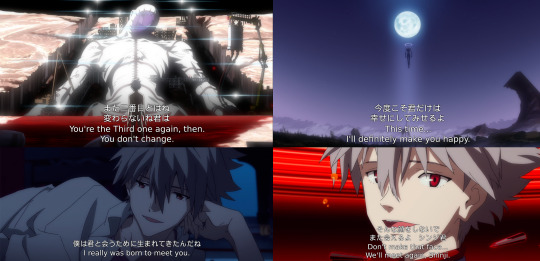
Some relevant lines from Kaworu in 1.0, 2.0 and 3.0. Full sized image here.
While at this stage, we lack information on how much Kaworu knows, we are at least aware of his knowledge of previous iterations of the Eva world in that first line there: "The Third one again".
This is compounded at the very end of 2.0, in which he declares that "this time" (as opposed to previous times, presumably failed attempts), he will make Shinji happy.
In 3.0, there's a moment in which he seems to confirm to himself his musing in NGE of having been "born to meet" Shinji (notice the lack of のかもしれない "probably"), and following some more ambiguous lines we'll skip over, at the end of a long speech about parts of ourselves remaining in the world even after we're gone, he suggests he and Shinji will see each other again just before he dies.
These lines lead some fans to believe that the loops were in some way or another, under Kaworu's control. This iteration of loop theory suggested that the loops exist so that Kaworu, who remembers the events of NGE, can achieve his goal of "making Shinji happy".
ESTABLISHING OUR BASES, PART 2: THE RED SEA
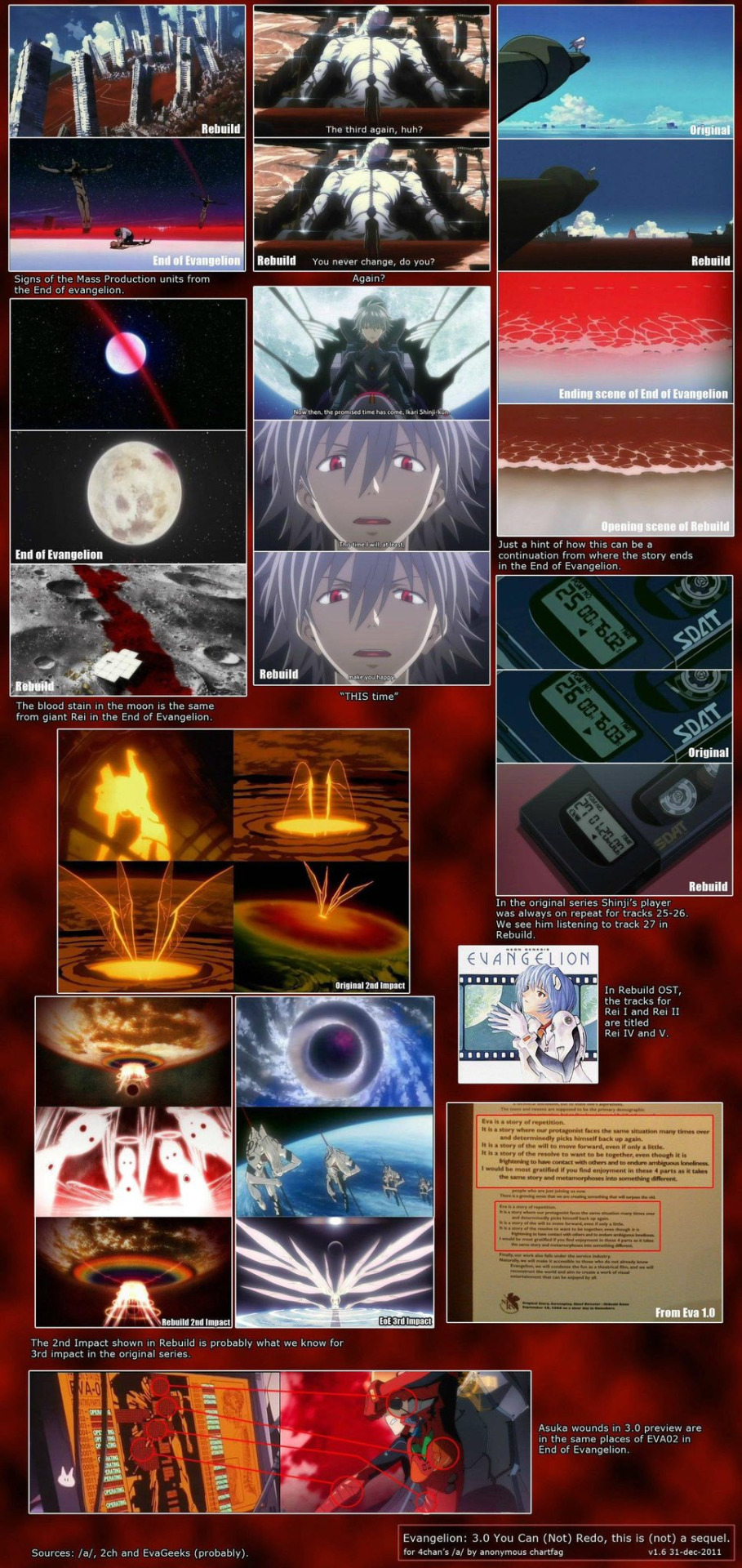
Non-exhaustive chart of potential connections between Rebuild and NGE/EOE, compiled by users on /a/ board in 2011. Full sized image here.
There are several environmental aspects of Rebuild's world that seemed to suggest a connection to The End of Evangelion, most obvious amongst these being the red sea.
As Kaji explains in 2.0, the seas were blue prior to Second Impact. Flashbacks to this event reveal that it bore slightly more in common with EOE's Third Impact than NGE's Second; note the presence of the Black Moon in the comparison above.
Early on in 1.0, there's a shot that shows cross-shaped white outlines in the red sea, that appear to be remnants of EOE's crucified mass production units.
The moon in Rebuild also has a large, red streak on its surface, that could be the bloodstain that was left there by Lilith in EOE.
Additionally, Shinji's SDAT in NGE always looped the same two songs, shown under the track numbers 25 and 26. In Rebuild, Shinji's SDAT's track number begins at 27, and goes up from there (it seems to represent the relationships he forms with other people).
Some iterations of loop theory suggested that Rebuild was set directly after End of Eva, and that the events of Second Impact as remembered by the cast were actually EOE's Third Impact.
Additionally, though its relevance to any canonical NGE content is tenuous (tenuous, but not irrelevant when it comes to Rebuild; see the bonus chapter), Sadamoto's NGE manga also ends with a kind of timeloop.
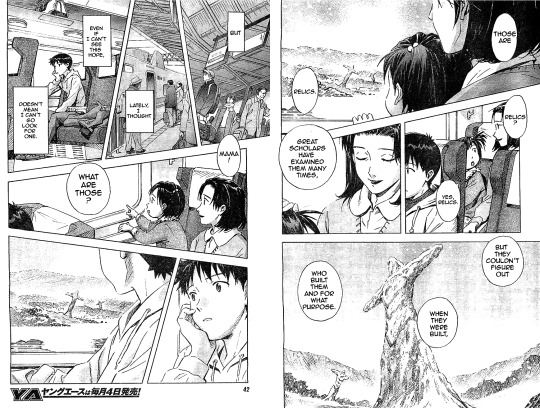
From the epilogue chapter of Yoshiyuki Sadamoto's Neon Genesis Evangelion manga. Full sized image here.
After Instrumentality, the epilogue flashes forward to a long time in the future, where the crucified Evas are seen as some kind of relic from an unknown time.
We see Shinji, Asuka and Kensuke reincarnated, and Shinji and Asuka meet for the first time, with some sense that they've seen each other before.
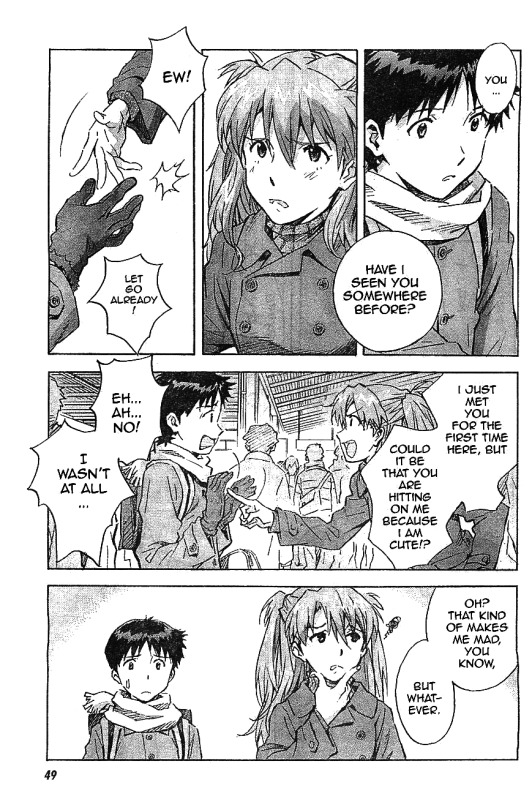
Full sized image here.
This ending could be seen as an explanation of sorts of what's going on in Rebuild; the characters have been reincarnated a long time after the fact, while elements of the old world remain as part of the environment.
ESTABLISHING OUR BASES, PART 3: DOUBT
It should go without saying that, even at the time, these particular conclusions had holes in them. (This is to say nothing of the hundreds of other iterations of loop theory; if we went through every whacky headcanon explanation people posted on Reddit under the guise of it being any kind of genuine theorization, we'd be here all day)
Sequel Theory, especially past 3.0, required you to ignore contradictory information being presented in the same scenes the evidence being drawn on was. The comparison image I included earlier (it pre-dates 3.0's release, but was certainly spread around long after the fact) suggests that the Four Adams as they appear in 2.0's flashback could have been the Mass Production Evas (of which there are 8, not 4!). Two of the lines from Kaworu it included also don't support this line of reasoning; both "This time..." and "You don't change" imply multiple previous loops, not a singular. And while we haven't mentioned them so far, the coffin he emerges from in 1.0 being one of several was also something people were aware of back then.
Speaking of Kaworu - Shinji's Happiness Theory doesn't seem to line up with the way he goes out in NGE, either. He asks Shinji to kill him with the goal of achieving true freedom; it doesn't seem like he's looking for a next time, but rather an ending, away from his destiny as an angel. It doesn't really follow that Rebuild's loops would be a journey he'd set himself on willingly, rather a circumstance he's put into by some other force.
SECTION 2: PAYOFF
3.0+1.0 responds to the foreshadowing of previous entries in a way that's kind of inconclusive, on its face. I'm going to save the potential answers for the next section; for now, let's just go over the information we did get, including some things you may have missed.
PAYOFF, PART 1: OUT IN THE OPEN
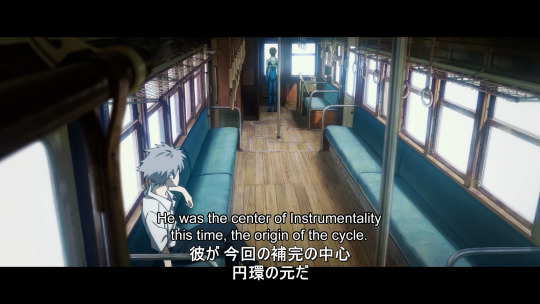
Kaworu describes Gendo as being the origin of the cycle. Full sized image here.
Our first piece of confirmation, and first in-universe mention of the loops (or "cycle"/"circle"), is this line. "Gendo was the center of Instrumentality this time", the "this time" implying there have been other Instrumentalities with other person/s at the center. "Origin of the cycle" may indicate that Gendo is in control of the loops as a whole, or it may instead indicate that different people start them, perhaps through Instrumentality.

Asuka wakes up on the beach. Full sized image here.
After coming to terms with her feelings, Asuka "wakes up" in the same spot she was lying at the end of EOE, wondering if she was asleep. This is still in the anti-universe, but as was established by Gendo earlier on in the film, the Evangelion Imaginary and the anti-universe as a whole manifest as parts of one's memory. Asuka is our POV character for this section with her, so she must recall having been here. Maybe you could interpret "was I asleep?" as Soryu, specifically, having woken up.

Selections from Kaworu's Instrumentality. Full sized image here.
Anything that focused on Kaworu here was always going to be the juiciest in relation to the loops, but it's surprisingly upfront even then: There have been multiple previous loops, and Kaworu is not in control of them, he just continues to exist without agency over them like all of the other key players do. (That's both of our aforementioned Theories disproven in one scene!)

Kaworu introduces the "Book of Life", Kaji clarifies the details. Full sized image here.
We're also introduced to a new concept here, the "Book of Life". There's very limited information on what this does, but at least Kaji is here to fill in some details Kaworu conveniently leaves out, as he likes to do (that, if nothing else, Shinji and him meeting over and over again is something Kaworu has power over.)
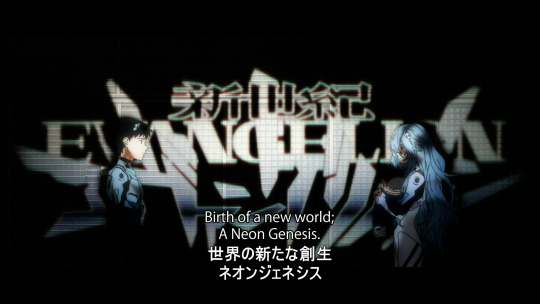
Rei and Shinji discuss the birth of a new world. Full sized image here.
Most of Rei's instrumentality scene exists to wrap up the other aspect of Rebuild's narrative we're not talking about here, so I'll skip past all of that to this: with Unit-01 and the Spear of Gaius, Shinji is capable of creating a new world, through a power known as Neon Genesis. It may be worth noting that Shinji has to clarify that he isn't going to rewind time or revert the world, just create a new one on top of the existing. This may establish a precedent for characters in control of Instrumentality being able to do both of those things.
PAYOFF, PART 2: A CLOSER LOOK
NGE has a LOT of references to the years its set in. Even beyond the on-screen text, there's plenty of instances of plaques and other signs with the 2015 date on them. Rebuild, however...

Yui's grave as it appears in 2.0. Full sized image here.
The only time we ever see a date in the first three films is here, on Yui's gravestone in 2.0. It's partially obscured by flowers, and may appear at first to read the same as her NGE grave did. On closer inspection, though, you can clearly see there's a 0 in front of 2004.
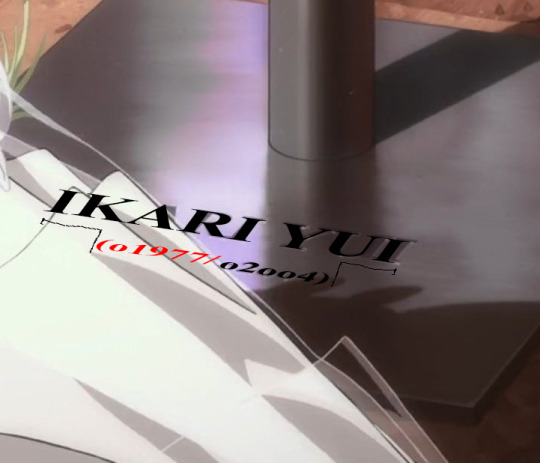
This could be what the gravestone has written on it. Full sized image here.
One time could mean anything, but it becomes a pattern when we see more dates in 3.0+1.0...
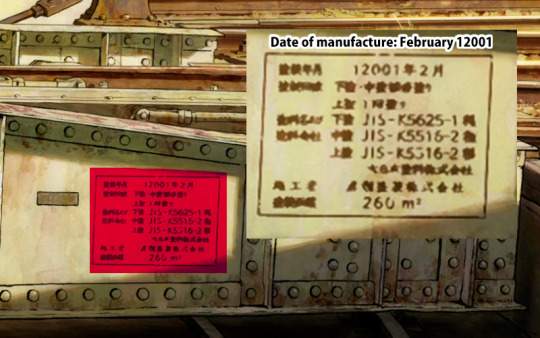
The manufacture information on the railway track turntable in Village-3. Full sized image here.

The plaque on the AAA Wunder. Full sized image here.
Looking at that date given on the railway turntable, the earliest date 3.0+1.0 could take place is the year 12001.
This, combined with the physical evidence present in the first two films, seems to imply that Rebuild follows the same rules established in the Sadamoto manga, that the loop isn't necessarily a reset of the world, but rather a continuous stream of time in which the characters are reincarnated. It makes sense Sadamoto would use this as the basis for his ending, too - he worked on the first two films, and the Mari bonus chapter clearly demonstrates that certain aspects of Rebuild were solidified during their production.
Furthermore, the scene in which Shinji asks Gendo what he wishes for has more visual references to EOE than you might think...

Gendo grasps his right arm, as if he remembers the time he lost it. Full sized image here.
The arm thing is obvious, and the line he says there could be about EOE, but you might notice something else in that image on the left there. There's a picture of Shinji in the background.
That image comes from one of the flashing sequences in EOE's Third Impact, in fact, the entire sequence is overlaid on top of that shot of Gendo.
This shot in 3.0+1.0 versus the same sequence in EOE. The encode of 3+1 I was using was dropping frames here, so I had to cut some of it out. Video mirror here.
By the way, adult Asuka's official name, as used in every piece of merchandising she's been in so far, is just "Asuka Langley", not "Asuka Langley Shikinami" or "Asuka Langley Soryu".
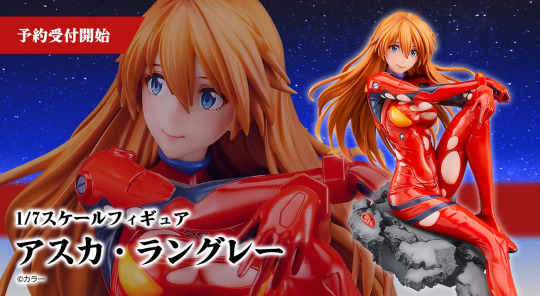
Good Smile Company's "1/7 Scale Figure: Asuka Langley". She has a fair few figures, all of them with this name. Other merchandise never calls regular Asuka this. Full sized image here.

Rei holds a doll of Tsubame. Full sized image here.
The same thing ends up happening with Rei in-universe. The version of her with long hair is clearly Rei from 2.0, who has been inside the entry plug this whole time, but when we see her on the stage, she's holding a baby doll. It has Tsubame (Hikari and Toji's daughter)'s name written on it.
It seems to follow that different versions of the same character end up re-joining into one during instrumentality, be that cross-loop like Soryu and Shikinami, or in-loop, like Rei and Sokkuri (Lookalike). This would appear to go beyond just regaining memories of previous loops, as Rei and Sokkuri existed in the same loop independently of one another.
SECTION 3: A PROPOSAL
And now, to get into the real meat of the issue.
...Whose doing was this, exactly?
Here's the thing: Kaworu, we can already rule out. We know it wasn't him.
The next most likely candidate you might think of is Gendo, but... is he, really? Because Gendo died in EOE (perhaps not physically, but regardless), killed by Yui, but ultimately of his own volition. He had come to terms with himself when he died. He doesn't seem like someone who would have still had unfinished business.
Then, what of Shinji? Well, I think it's the same deal with him, too. Shinji might not have found his place in life at the end of EOE, but he also doesn't seem like he was clamoring to start over, after all of that.
In their video, "What was loop theory? Investigating the truth after Evangelion 3.0+1.0", Japanese Eva fan, Eva Fan (lol), of Minna no Eva Fan fame, gives us a different answer:
It was Yui.

Yui entered the Eva experiment for Shinji's sake. Full sized image here.
Yui's motives in NGE may have been left mostly up to the audiences' interpretation, but I don't think there's any doubt she loved her son more than anything.
As Unit-01, she becomes God at the end of EOE, accepting the burden of being the eternal proof of mankind's existence.
She leaves Shinji behind, knowing that he still hasn't found his place in life.
A PROPOSAL, PART 1: YOU WERE WAITING FOR THIS MOMENT

Yui leaves Shinji as he comes into his own. Full sized image here.
The end point of the loops and emergence into the new world:
Shinji makes the decision to create a world that doesn't need the Eva.
Shinji and Yui, previously one being, separate.
Shinji breaks the curse of the Eva, becoming an adult, and now away from his mother, emerges into the real world.
As explained by Gendo, the anti-universe, the end point of Rebuild's story, is also the beginning, and somewhere Yui, at one point, resided.

The beginning and the end are one in the same. Full sized image here.
The anti-universe is "the one and only place fate may be bent to one's will". Shinji, in his parting words to Yui in EOE, tells her he thinks he'll keep making the same mistakes over and over.
To quote Hideaki Anno: Eva is a story that repeats.
In the aforementioned Eva Fan video, they suggest that the anti-universe may in fact be the world of NGE (perhaps, the world inside of Unit-01). Yui creates a new world through Neon Genesis, one which resembles the old, to tell the story of Shinji anew. To give him another chance to grow.
For as long as Eva is Shinji's story, it is Yui's; her goal was to bring Shinji a bright future, after all.
The act of piloting the Eva sees the child return to the place they resided before birth; back into the comfort of their mother's womb.
In Rebuild, the “mother” seems to become all but irrelevant - Yui Ayanami may reside inside Unit-01 but this is never touched on in the same way; Asuka’s mother doesn’t seem to even exist, and her original seems to reside inside Unit-13. The existence or non-existence of a mother’s soul inside of an Eva dictates nothing about who can synchronize with it (see: Unit-02, Unit-08, Unit-13, etc). However, taking a step back, it’s almost as if the reason why the presence of the “mother” is missing from the material world of Rebuild is because the entire series takes place within the world the mother created.
If Shinji entering the cockpit of an Eva unit in NGE is returning to the womb, then what is Shinji doing by existing in the world of Rebuild?
In deciding to create a world that doesn't need the Eva, Shinji is accepting life without his mother. The parting of mother and son represents the break in the loop.
He emerges into the new world, reborn as an adult.
INTERJECTION: WHAT’S IN A NAME?: YUI IKARI/YUI AYANAMI
Rebuild’s Yui’s name isn’t Yui Ikari (at least, her maiden name isn’t) - It’s Yui Ayanami.
In NGE, Gendo took her surname when they married. In Rebuild, Gendo already had the surname Ikari, and Yui Ayanami took his.
I think fans have been generally puzzled by the purpose of this change, but this interpretation - that Yui Ikari from NGE is the heart of the loop, the God that created the world and the God that Gendo would kill at the end of 3.0+1.0 - would seem to explain why this is the case. She’s Yui Ayanami because she’s a copy - like Rei is - of the original Yui. A Yui created by Yui Ikari.
This also may explain why the date on Yui's grave says "02004" - after all, it's the grave of Yui Ikari, not the grave of Yui Ayanami.
Rei of NGE is more than just a clone of Yui, she also holds a piece of Yui’s soul (in the form of emotional memory), while Yui herself resides in Unit-01. Therefore, it stands to reason that Yui Ayanami is not really an individual, but rather someone who holds a piece of Yui Ikari’s soul - I think even more so than Rei (who undeniably is an individual). Yui Ayanami may function as a kind of messenger for Yui Ikari, who holds the knowledge she has and steers the story in the direction it needs to go. There are many players in Rebuild who are more like symbols than characters, and I think this is a huge part of why Yui Ayanami is not a character like Yui Ikari was.
For the sake of brevity, I’m going to use “Yui Ikari” to refer to Original Yui, and “Yui Ayanami” to refer to Rebuild Yui, unless stated otherwise, for the remainder of this post.
A PROPOSAL, PART 2: ...WERE YOU THERE THE WHOLE TIME?
Kaworu himself wasn't brought into Instrumentality in EOE directly. Rather, the fetus of Adam was, through Rei intaking Gendo's hand. If souls like Rei and Sokkuri are capable of rejoining into one in Instrumentality, I wonder if the presence of Kaworu in Instrumentality can be explained by his soul rejoining with that of the Adam fetus. He definitely appears as Adam there, the same way Rei is Lilith.
Which brings us to this:

Shinji and Gendo upon seeing familiar souls: "Were you there the whole time?". Full sized image here.
Gendo offers Shinji the apology he never got to hear in EOE, and then realizes: Yui's soul was residing in Shinji.
Instrumentality likely reconciled the souls of Yui Ayanami (the individual who became Unit-01 in this timeline) and Yui Ikari (the soul who lived on as God, and in her son), the same way it may have reconciled Kaworu and Adam's.
For as long as Yui's soul resided in Unit-01, and in Shinji, her story was not over. For as long as Shinji was stuck in his loop of making the same mistakes over and over, Eva's story was not over. For as long as the Eva exists, Yui will, and End of Eva leaves Yui there, in space, as the eternal proof mankind existed at all.
If 3.0+1.0 says "goodbye to all of Evangelion", it must be the end of Yui Ikari's story, too.
INTERJECTION: WHAT’S IN A NAME?: “SHIN EVANGELION”
The Japanese title of Evangelion 3.0+1.0: Thrice Upon A Time is シン・エヴァンゲリオン劇場版𝄇, (Romaji: Shin Evangerion Gekijouban𝄇, English: Shin* Evangelion Theatrical Edition𝄇”).
There are three points of interest in this title:
Shin - The use of “Shin” here falls in line with the titles of Hideaki Anno’s other recent films: Shin Godzilla, Shin Ultraman, and the upcoming Shin Kamen Rider. While I’m not really the best person to explain this as I’m not really familiar with the source material, the other Shin films are based pretty heavily on earlier works in their respective franchises (I believe both Shin Godzilla and Shin Ultraman have sequences that are recreations of scenes from the original movie/series). Shin Eva also, obviously, does the same thing with NGE and EOE scenes.
*According to an interview with producer Akihiro Yamauchi on Shin Godzilla, the title of “Shin” was chosen for the film due to the variety of meanings it conveys. In all four titles, it is written ambiguously, and could be read as “new”, “true”, or “God”, amongst other things.
Evangelion - NGE’s title and Rebuild’s title are actually spelled differently. エヴァンゲリオン is the spelling of Evangelion used in NGE, ヱヴァンゲリヲン is the spelling used in Rebuild’s title (not the in-universe machines, for the record). They’re pronounced the same way, but Rebuild’s spelling uses characters that are a little archaic (if you want to get technical, it could be romanized as “Wevangeriwon”; note the use of “wo” instead of “o” just like in Kaworu’s name, and you probably get it.)
Shin Evangelion uses the NGE spelling, not the Rebuild spelling, which makes it sound like “Shin Neon Genesis Evangelion Movies”, not “Fourth Entry in the Rebuild Franchise” (in fact, “Evangelion Gekijouban” comes from Death and Rebirth/End of Eva’s Japanese names). Earlier posters for this film in English gave it the NGE font rather than a Rebuild style logo, which pretty accurately represents how this looks.
The symbol at the end - The symbol at the end of the title, is a symbol that’s used in sheet music. This could be read two ways - “Shin Evangelion Gekijouban: End”, or “Shin Evangelion Gekijouban Repeat”; If you assume 𝄇 is one symbol, then it’s a “repeat” sign (tells the player to repeat a section of the sheet music). If you assume it’s a colon and then a subtitle, then it’s an “end” sign (𝄂, signifies the end of the piece.)
A PROPOSAL, FINAL PART: TO KILL GOD
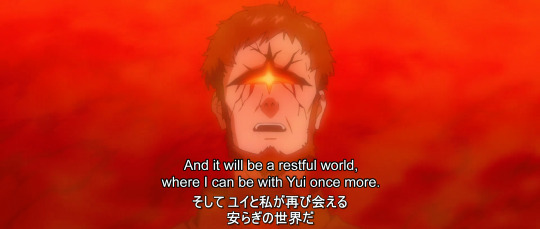
Full sized image here.
Gendo's goal in NGE and Rebuild is the same: To be reunited with Yui.
In Rebuild, he will become God through the use of the Key of Nebuchadnezzar and trigger the Additional Impact with himself at the center, so he can see her again in Instrumentality.
But there's a second aspect to this plan... Killing God.

Gendo lays out his intentions. Full sized image here.
I think it would be naïve of me to suggest that Gendo had any intention of ending things when he said this. These lines obviously pertain to something else (I think all of this is covered in the process of beginning the Additional Impact anyway), and it's made clear that he goes into Instrumentality as stubbornly as he always is.
He fully intended to destroy all of the spears, so nobody would have any way of manipulating or ending Instrumentality, so he could live peacefully with Yui for the rest of time.
Whatever it might have meant there... "Killing God" takes on a completely different meaning by the end of the film.
Yui Ikari is an existence that will live on indefinitely; someone who will never die, even long after humanity is gone. In becoming Unit-01, she alone will wait in the universe forever.
She once resided in the anti-universe; the Promised Land, the one and only place fate may be bent to one's will; she created the world of Rebuild of Evangelion, the beginning of everything.
Yui did all of this to give her son a better life. To let him try over and over again until he broke the curse of the Eva, and emerged into a brighter future.
She, Unit-01, Evangelion as a whole, could not rest until Shinji grew into his own.
Gendo comes to the conclusion during Instrumentality, after bleeding his heart out to his son, that he isn't any closer to reuniting with her.
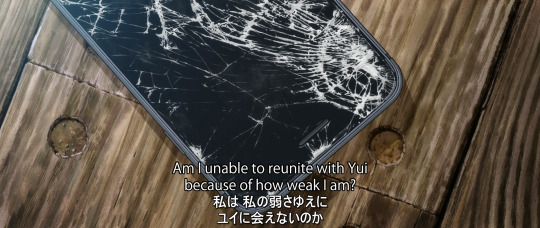
Full sized image here.
But after acknowledging Shinji's adulthood, accepting his own fragility, and resolving their story...

Full sized image here.

Full sized image here.
...He realizes she was right in front of him this whole time.
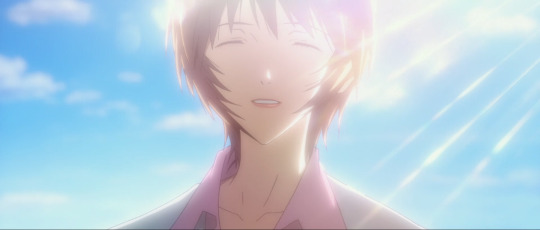
Full sized image here.
With this, Gendo exits the train - the same train his story began, the train station he abandoned Shinji at all of those years ago - his story is over. He no longer seeks eternal life with Yui.
As Shinji breaks his own curse of Eva and is reborn out of the comfort of his mother's world, and into a world of his own creation, he says goodbye to all Evangelion.

Full sized image here.
Gendo, in peace at the end of his own long journey, is willing to let Yui sleep.
And so, he kills God.
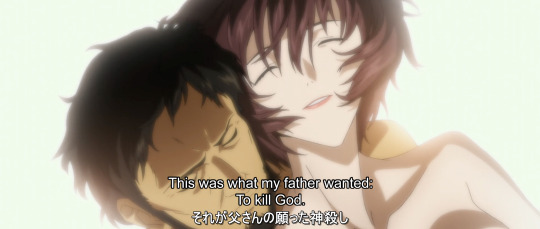
Full sized image here.
#evangelion#rebuild of evangelion#neon genesis evangelion#analysis#yui ikari#gendo ikari#shinji ikari#kaworu nagisa#yui ayanami#evangelion 3.0+1.0#shin evangelion#shin eva#nge#eva#loop theory
469 notes
·
View notes
Text
A BRIEF DEVILMAN CRYBABY RANT
What on Earth is Devilman Crybaby?
I watched Devilman Crybaby, the 2018 anime, because I heard that it was like a mix between Neon Genesis Evangelion and Berserk.
That’s true, in terms of imagery, symbolism, structure. Even the soundtrack of Devilman is similar to NGE
Devilman Crybaby is also similar to Dune in that both series ask the question “What makes us human?” Answer that question very quickly, and then proceed to spend the rest of the series adding additional footnotes to this thesis.
With Dune, the answer is extraordinarily complicated. According to Devilman Crybaby, it our ability to cry.
Devilman’s themes are not really subtle or complex. In fact, unlike the other three stories I mentioned, it’s kind of stupid, and that’s what makes it wonderful.
Beginning the first episode, the opening theme song and first scene made me think I was in a for a surreal, poetic experience. It’s a fantastic first scene, introducing us to the characters of Akira and Ryo and setting up the theme of kindness all the while having a wonderful atmosphere.
Then, we suddenly cut to a high-school track practice, and the next few scenes are a blur of horniness, weird jokes, and some of the most inhuman dialogue I’ve ever seen.
A lot of the scenes are also so nonsensically paced, either being way to slow or way to quick, ending either abruptly or a bit after they should have ended. There’s also so many scenes where the actions of character’s straight up make no sense, like that entire scene at the peir.
However, the end of the episode…it sure was something. It sees some pretty awesome body horror and an absolutely brutal fight.
A complaint I do have is the animation. It’s…not good. The character designs themselves are often enjoyable, but the drawing style is just kind of ugly. Ryo’s a good example of this. His design as this thin, regal looking, blonde, pale person who always dresses in white does a great job at telling you what he is as a character, even if it’s basically just the design of Griffith from Berserk. However, he’s drawn with these weirdly shaped eyebrows, and his haircut just looks bizarre. This seems really nitpicky, but it’s important.
A lot of the monsters also seem like they could be a lot cooler if the animation was a bit more detailed.
Not only that, but you can tell that this show was very low budget with all these instances of re-used animation and many obvious cost-cutting measures. There are multiple scenes where we barely see the characters talk and instead just see looping shots of the environment around them.
Oh, also this first episode is super horny. It’s close to being porn sometimes, and I’m not joking or exaggerating. I’m fine with art being horny, but there’s a certain point where it just becomes indulgent. It doesn’t help that, 90% of the time, it’s women being sexualized.
I’m not even going to get into the way the character of Miki is treated.
The episodes after the first one…fine, I guess.
The problem is that this story jumps the gun on its weirdness and darkness, ending the first episode with something very weird and dark. As such, the next few episodes, which are remarkably less insane, just saw me waiting for things to go crazy again.
Another problem is that the series is ridiculously quickly paced. I really liked the main characters of Ryo and Akira, and I liked their dynamic, but they barely had any time together. It doesn’t help that a lot of time is being spent with subplots.
This quick pace continues to hound the series until the very end.
People in this series keep talking about rising crime rates and how the world is going to heck, but this is never elaborated upon.
Characters like the beatboxing gang, Miki’s family, Miko, Psycho Jenny, Akira’s parents, the gay guy, Silene and her friend, and many others, go underdeveloped.
Stuff like government conspiracies, the tattoo gang, the demons having a secret plan, christianity, sexuality, and the meta aspect of the in-universe Tv show, are all underdeveloped.
Only a few plot elements feel completely finished, like running. The use of the relay race at the end is pretty creative, with Ryo not taking the baton, serving as a metaphor for his apathy.
Relay running is used similarly in many other placed. It symbolizes how the gay guy and Miko are being individualists, and Akira being the anchor shows how others depend on him. It ads a bite to Miki’s death. Blah blah blah.
The PE coach was also a brilliant use of set up and pay off carried out over the episodes.
The idea of hands grabbing others is an image used repeatedly throughout.
Miki is also a really nice character, and while I was annoyed at how little agency she had for most of the show, I appreciate how she did help save Akira in that one scene. Unfortunately, that was it, and I feel like we barely knew her as a character.
The tv series has a racism metaphor that I would rank 4/10. It shows how racism against devilmen is bad, but it also claims that demons are ontologically evil and it’s okay to kill them all. There are suggestions that they do have hearts, but this is never elaborated upon.
We see a running pattern here, the show not having enough time. As a result, its themes are half-baked and overly simplistic. It talks about how we should get along, and how humanity are the real monsters, and how individualism is bad, and empathy is nice, and how imperialism is bad, and all that jazz, but it never tied these ideas together.
Compare this to Eva, where it feels like End of Evangelion managed to touch on every idea the show had set up. That’s probably because Eva was twice as long.
It also doesn’t help that this show is almost laughably unsubtle. Miki’s “social media” post that saves people is so on-the-nose.
There’s also scenes that are just weird, like that one scene with Bonito flakes. Also, what was the deal with the kid looking up porn. Also, Donald Trump canonically exists in it. Also, who were the people shooting at the rainforest people?
I’m sure there’s an explanation, but that’s not important. It’s fine if a show is ambiguous, but this doesn’t feel purposeful so much as it feels sloppy.
It feels like the show doesn’t know what it wants to be about, with their being two or three episodes were are titular crybaby barely appears. That’s not great.
I don’t hate all of these subplots, it’s just that none of them go anywhere. For instance, we watch this romance bloom between Miko and Frizzy Haired Guy for two episodes, and I will admit, I like Frizzy Haired Guy. I was rooting for him. Then, he gets killed off and is barely mentioned again. All that buildup was for nothing.
I suppose the story is trying to purposefully be unsatisfying, something both Eva and Berserk do, but when you do that, you need to have a reason. They could have made the scene where Frizzy Haired Guy die really tragic, but they instead make it all flashy and confusing so they can have us wonder if he’s maybe still alive for a bit.
Also, we had this whole episode introducing us to gay dude, and then he randomly goes evil and gets killed off in the last episode. So long, character development!
Comparing this show to Eva again, the ending is almost amazing. The imagery sounds awesome on paper, but the animation and character designs are so minimal. It also feels like Akira stopped growing as a character after the first six episodes. He feels almost removed from the destruction, as it’s all happening because of someone else.
I could also nitpick that entire last episode to hell for the thousand different moments that are written weirdly, like that one scene where Ryo doesn’t notice that Akira’s bottom half has been removed. Also, that ending shot was way to one the nose in looking like End of Evangelion. I know the Devilman manga came before Eva, but I don’t care. Why is the sea even red?
Despite all my complaining, I still like this show. The characters are fun, even if they really aren’t that complex (especially all the characters that aren’t Ryo and Akira). The world-building is imaginative and awe-inspiring, many of the action scenes are pretty cool, and there are moments when the minimal animation does work.
Also, sometimes it’s nice to have a story that’s willing to be as bleak as this one, and as weird as this one.
To be honest, I feel like it could be weirder. I generally understood what was going on most of the time. In fact, the most confusing scenes were from the ordinary slice-of-life segments, like when that family had that giant The Last Supper painting.
I also think an idea which is carried out to its fullest is the idea of apathy. It’s the source of most of the conflict between Ryo and Akira. The ending sees Ryo destroying everything, including the one person he cares about, in his pursuits. It’s a tragic irony, I guess.
I feel like it would hit more if we had more time with these characters. What was Ryo’s reaction to learning that he was Satan and that everything he knew was a lie? What was the nature of his relationship with Psycho Jenny? What were Ryo’s actual motivations beyond “destroying humanity”.
If Ryo’s goals were more fleshed out, than the irony of him accomplishing his goals at the cost of the one thing that truly mattered to him would hit much harder.
This is definitely a story which you’re supposed to feel, not understand, but I don’t think I felt everything the show wanted me to feel.
Another victim of the quick pacing is a lack of atmosphere. Now, the show does have a few sequences with some fantastic, otherworldly atmosphere, like the beginning. However, there are many times when it would be nice if the story could slow down a bit and let us enjoy the imagery.
The lack of atmosphere in the final episode is also a result of how needlessly complex the show can be sometimes. A lot of lore is thrown into our face in that episode, as well as a lot of character backstory and insight. A lot also happens in that 25 minutes. It would be nice if we got time to digest what was happening.
I feel like I need to stop, because it seems like I dislike this show, but, there were times when I was on its wavelength.
There is some beautiful and horrific imagery in here. I love Satan’s design, and I feel like it actually works with the minimalist artsyle.
A lot of the scenes showing nuclear war in the last episode were pretty breathtaking, as the show is pretty great at showing scale and grandiosity. The use of filters really helps to sell the effect. The flashbacks to Ryo and Akira’s childhood also had an awesome juxtaposition, with these brightly colored childhood memories that use these long shots clashing with the dark and frantically edited present.
There are also many scenes of brutality earlier in the series that are legitimately pretty shocking, mainly the massacre at the track meet.
This is a series that has a lot going for it, but it ultimately stumbles at the finish line, ending up seeming more like an ant by the feet of the stories that the manga inspired.
However, they say the book is always better, so I’ll be sure to check it out.
4 notes
·
View notes
Text
Evangelion: You Can (Not) Marathon — (Part 4)
Neon Genesis Evangelion, “Episode 4: Rain, After Running Away/Hedgehog's Dilemma”

Continuing my Evangelion re-watch marathon with NGE, "Episode 4: Rain, After Running Away/Hedgehog's Dilemma"! For my thoughts on the previous episode, click the link to the post below:
With that out of the way, let's dig in! I’m especially excited to revisit this episode as this was always one of my personal favorite episodes from the series!
I love Misato’s dialogue when she reacts to seeing Shinji’s room completely empty with only his ID card and a letter on his desk: “*Sigh...* He’s run away… I’m not surprised…”
Even without reading the goodbye letter, Misato immediately realizes what is going on because she and Shinji truly are similar when it comes to their loneliness and desire to run away from the rest of the world.


This whole montage of Shinji wandering aimlessly back-&-forth around Tokyo-3 and the Japanese countryside perfectly encapsulates the major reason why this episode in particular has always stood out among my personal favorites: namely it’s ability to effectively communicate so much information about Shinji’s character primarily through visual storytelling and with little to no dialogue!
Elements like Shinji going back-&-forth on the looped train station while repeatedly listening to tracks 25 & 26 on his cassette radio convey Shinji’s lack of motivation and finding escapism through repetition, the scene of him witnessing two people kiss in the movie theater (the film is a dramatized retelling of Second Impact funnily enough) highlight Shinji’s simultaneous desire for and aversion towards having intimate relationships and physical contact with others, the pink-filter scene of Shinji feeling overwhelmed by the sight of Toyko-3 and subsequent leaving to the countryside represents Shinji’s fear of the pressure of responsibility and desire to run away from pain, while him coincidentally encountering Tokyo-3 again on the mountainside is reminiscent of Shinji’s inability to truly run away as he keeps coming back to piloting the EVA in order to find some purpose in life, and the image of Shinji sitting by the cliffside is reflective of his suicidal ideation since the landscape is visually based off the real-life Owakudani area which is sadly well-known for its high suicide rates.
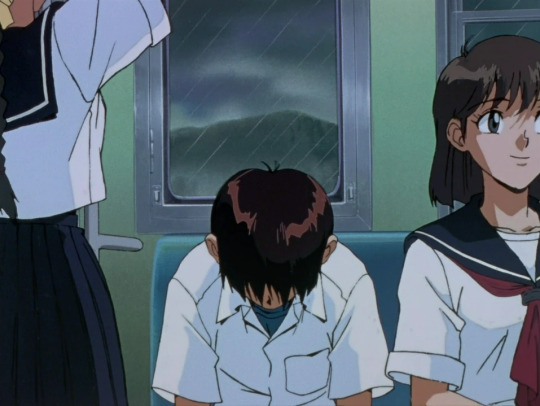

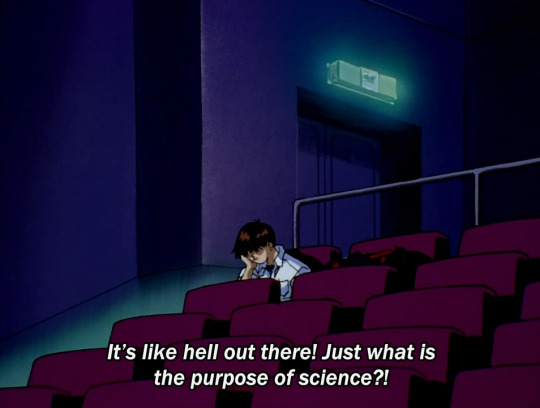
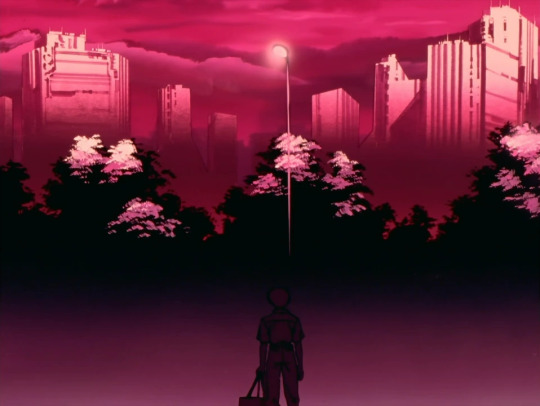



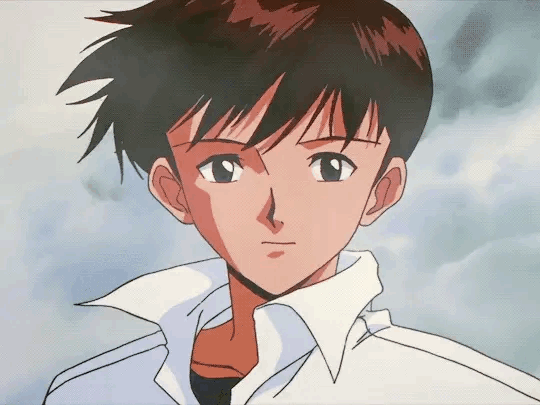
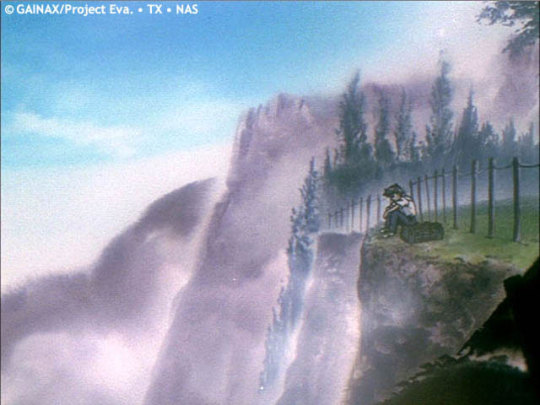
Interestingly though, series' creator Hideaki Anno has stated before that a defining feature of Shinji's character is that, "he is a boy who doesn't even have the courage to kill himself."
And it is here where I feel its appropriate to address a major elephant in the room when it comes to analyzing anything Evangelion-related. Specifically, in addition to being reflective of Anno's own personal struggles with depression, EVA as a series simultaneously functions as a meta-critique of the Japanese otaku subculture. For those who aren't aware, "otaku" essentially somewhat functions as a Japanese synonym for a nerd or geek with obsessive interests. In his essay "おたく / Otaku / Geek," Morikawa Kaichirō argues that "contemporary usage of the word otaku [originating] in an essay titled 'A Study of Otaku' that appeared in the June 1983 edition of Manga Burikko, an erotic manga magazine [by] Nakamori Akio (1)." Following the infamous 1989 otaku murders in which an anime fan named Tstusmo Miyazaki killed 4 young girls, Kaichirō elaborates that otaku evolved into a pejorative shorthand for "person who has retreated into a fantasy world, unable to tell the difference between reality and illusion, and is sexually attracted to small children (8)."
Concerning Evangelion, both Anno and the other founding members of Studio Gainax were pioneering members of otaku subculture within the anime industry, but during the production of his previous anime, Nadia: The Secret of Blue Water, Anno fell into a four-year-long struggle with severe depression and became increasingly introspective and critical about the certain elements of otaku lifestyle which he grew to hate about himself and others. While Anno today openly embraces the more positive aspects of his otaku identity, during the mid-to-late 90s Anno's clinical depression and growing disenchantment with otaku significantly influenced the overall narrative and themes of the franchise. This is supported by an interview from the 1997 Neon Genesis Evangelion: The End of Evangelion Pamphlet with assistant-director Kazuya Tsurumaki, who described Shinji's "distant, awkward communication" with the rest of the series' cast functioning as a parable for otaku IRL.
Now with that major aside out of the way, let's resume the analysis of the episode!
I think this scene answers my previous question about why exactly Shinji suddenly decided to disobey orders during the fight with the Angel Shamshel in the previous episode: Namely, after realizing that perfectly obeying orders like a robot got him nowhere, Shinji simply stopped giving a crap and was determined to just kill the Angel even if it meant he himself would get killed in the process. It further feeds into to the previous cliffside imagery which alluded to Shinji’s suicidal tendencies and his lack of any true desire to live unless he can be of use to someone else. It just goes to show how empty and hollow one's existence can feel when consumed by severe depression and self-imposed isolation. A true Hedgehog's Dilemma...
Also, while Spike Spencer’s “yes” replies to Misato can feel a tad bit sarcastic here, he does perfectly nail Shinji’s nihilism in this scene!
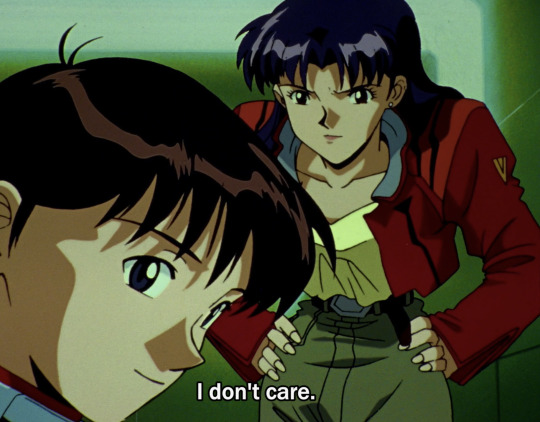

As much as I rag on Kensuke in the ADV dub for his crappy voice acting, I do love how he serves as somewhat of a foil to Shinji during the scene where Kensuke’s childishly pretending to be a military soldier before camping out with a wandering Shinji. While Shinji is a stand-in for the introverted depressed otaku (which is reflective of Anno’s own mental state during the production of NGE), Kensuke reflects the more nerdy escapist otaku who’s so overly immersed in their fandom passions that they blind themselves from the ongoings of the real world.
This contrast is best conveyed when Kensuke ignorantly states how jealous he is of Shinji for both being able to pilot EVA and live under the care of an attractive older woman like Misato, whereas Shinji reflects the harsh reality and emotional struggles that a 14-year-old effectively serving as a child soldier would endure. It’s likely no accident that Kensuke was cosplaying as a soldier during this scene, especially since the previous interaction between Misato & Ritsuko about the former’s concern for the mental health of the EVA pilots was juxtaposed with the latter coldly examining Rei’s physical health so that she could fulfill her duty as a cog in NERV’s military industrial complex. Ironically, the same industrial complex which Kensuke idolizes is the one which causes Shinji & Rei pain.
Also, we get another bit of foreshadowing about the EVA’s harboring the souls of the pilot’s dead mother’s as Kensuke reveals that just like Shinji he too lacks a mother.
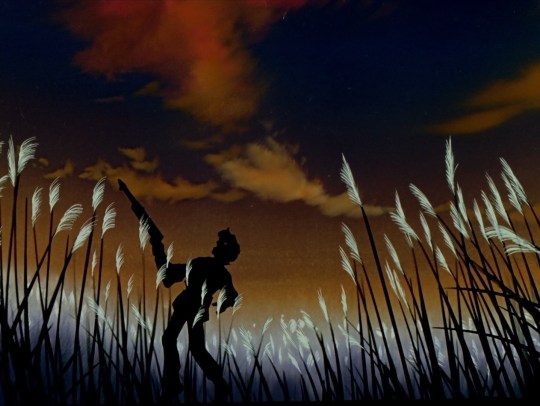
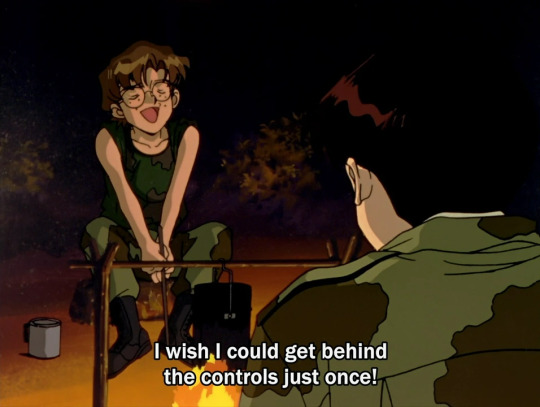

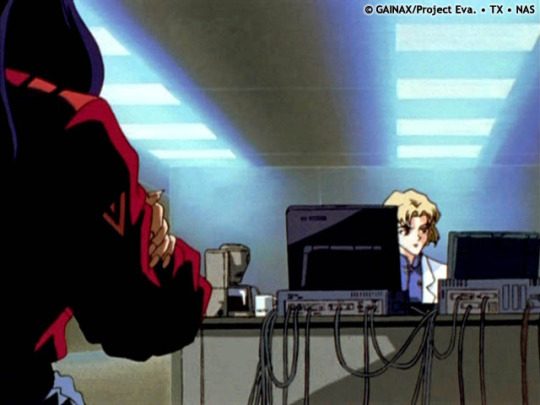
Misato’s angry reaction to Shinji stating that he’ll continue to pilot the EVA solely because it’s what’s expected of him and that he doesn’t want to place the burden of responsibility on Rei is… interesting. On the one hand Misato is exposing her limitations at being an efficient parental-figure/guardian to Shinji by letting the military commander side of her personality override her nurturing side by coldly scolding Shinji and telling him to leave if that’s going to be his attitude going forward. But on the other hand, I can’t help but completely agree with Misato’s rationale here since if Shinji’s going to continue piloting, then he should do so only if he legitimately wants to or is doing so to discover his own purpose in life, rather than doing so simply out of detached obligation or an aimless desire to gain validation from others. In this regard, piloting the EVA is metaphorical for growing up versus running away, something which Misato herself has and still struggles with.
And that’s why Misato's so harsh on Shinji here. It's because she knows exactly what he’s going through. But while Misato does legitimately want what’s best for him (which is why she feels that him quitting might be better for his mental health), she’s unable to express it in a tactful manner since Shinji in this scenario represents the part of Misato that she hates about herself.


Regarding the scene where Toji requests Shinji to hit him as recompense for him previously hitting Shinji back in Episode 3, I never noticed this before but Toji's request is actually reflective of his struggles with toxic masculinity. I mentioned before that Toji heavily fits into the archetype of the traditional school jock. And although he does subvert many of the traits associated with said-archetype (namely through developing a sense of regret for his previous bullying of Shinji and even empathizing and befriending him), Toji still embodies several attitudes associated with toxic masculinity through his belief of resolving conflict through physical violence. Whether it be him punching Shinji out of anger for EVA Unit-01 accidentally hospitalizing his younger sister, or Toji insisting that Shinji punch him back in order to “let bygones be bygones” between them.
In this regard, Toji is also experiencing his own form of the Hedgehog’s Dilemma which Shinji & Misato also deal with, since he struggles with expressing his feelings of empathy to others and relies on a tough-exterior and communicating primarily through physical pain.
And interestingly, this examination of toxic masculinity isn’t just limited to Toji’s character, but also too Misato’s as well since in previous episodes she scolded Shinji for “not acting like a boy” whenever he acted distant or reserved. And these harmful perceptions of “traditional” masculinity are something which Misato overcomes by the end of this episode when she realizes that the Hedgehog’s Dilemma is causing both Shinji and herself to shielding their true feelings by allowing themselves to be hurt and to hurt others. This is why Misato comes to regret her previous scolding of Shinji, and rushes to see him goodbye at the train station.
Also, I love how Misato’s realization of the harm the Hedgehog’s Dilema causes both her and Shinji is contrasted against one of Shinji’s most famous line’s in the entire series, exposing the true depths of his depression and self-loathing to Toji: “I'm the one who deserved to be hit! Not You! I'm a coward! I'm dishonest! I'm sneaky! And a wimp!”
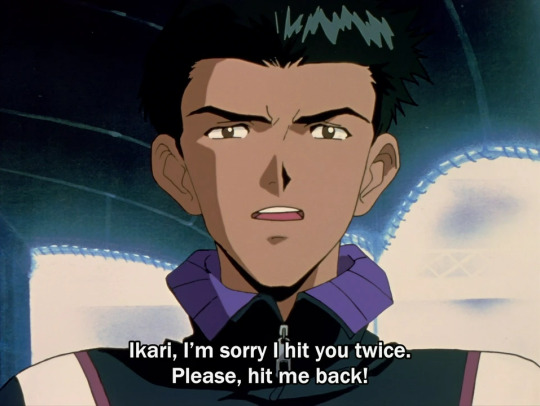

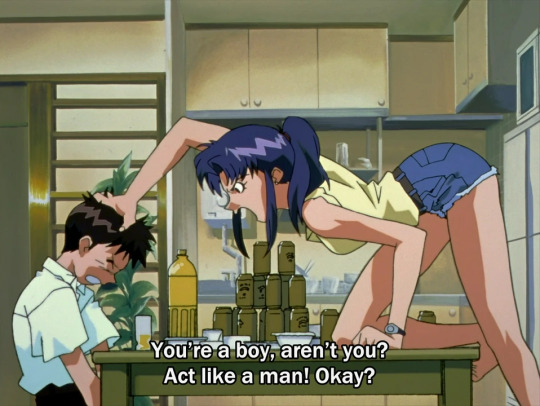
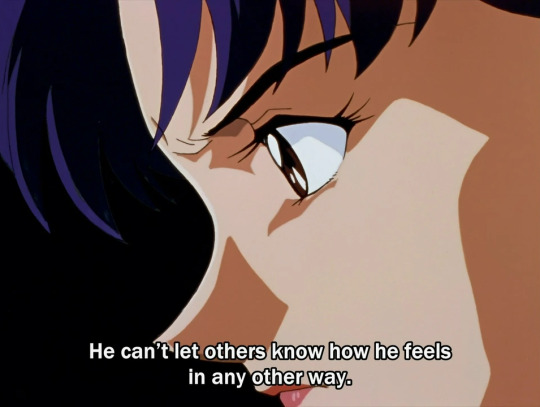


This final moment where Misato apparently arrives too late at the train station only to see that Shinji never actually got on (once again running away in a sense…), and the two stare at each other for a full minute across the station before calling back to their lines from Episode 2 (specifically when Shinji first arrived at Misato's apartment...), is yet another perfect example of communicating so much information and character development with very little to almost no dialogue! It’s at this moment Shinji finally realized that Misato does legitimately care about him as a parent/guardian-figure and was more than just his commanding officer expecting him to solely follow orders. And Misato finally realized that she needs to not hide her motherly affection for Shinji and start showing him legitimate support, instead of trying to shield her own loneliness through both her gruff military exterior and messy home life.
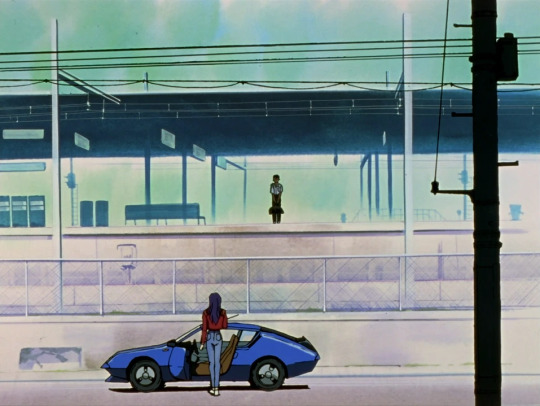


The duality between Shinji & Misato's respective Hedgehog Dilemma's comes full circle by the end of the episode. As Anno himself once clarified in a written statement for the July 1995 edition of Neon Genesis Evangelion Vol. 1:
"[Shinji] tries to live in a closed world where his behavior dooms him, and he has abandoned the attempt to understand himself. A cowardly young man who feels that his father has abandoned him, and so he has convinced himself that he is a completely unnecessary person, so much so that he cannot even commit suicide. And there is a 29-year-old woman who lives life so lightly as to barely allow the possibility of a human touch. She protects herself by having suface level relationships, and running away. Both are extremely afraid of being hurt. Both are unsuitable-lacking the positive attitude-for what people call heroes of an adventure. But in any case, they are the heroes of this story."
Well, that was NGE, "Episode 4: Rain, After Running Away/Hedgehog's Dilemma", and even after all this time this one still stands as one of my personal favorite episodes from the entire series! Even as far back as Episode 4, Anno was relying heavily on visual storytelling techniques which heavily distinguished EVA from your conventional giant-robot anime series! And that’s a huge factor why even upon rewatch this episode still holds up phenomenally well among the earlier episodes!
Funnily enough though, this episode was actually almost never produced and is the only one out of all 26 episodes in which Anno possesses neither a writing nor co-writing credit. According to the Platinum Booklet - Episode Commentaries, Episode 4 was originally absent from the original plot outlines for the series, stating that,
"In actuality, this episode was once omitted in terms of the series composition and it was planned that what is now Episode Five would come after Episode Three. But as production progressed, staff members voiced their opinion that perhaps there was a need to depict Shinji’s relationship with the people around him after Episode Three, and thus, this episode was made, greatly changing the contents from what had originally been conceived. Because of this, the script for this episode written after the script for Episode Five had already been finalized. This is the one and only episode of all the TV and movie episodes in which Director Anno did not have a direct hand in the plot and script."
All I can say is, thank goodness that this episode does exist. Regardless of whether or not Anno himself was directly involved with the writing process for this specific episode, you can feel his influence all throughout its runtime. Overall, definitely a strong contender for one of the best entries in the original series!
Next time... Episode 5 and our first real glimpse into the enigma known as Rei Ayanami!
#Evangelion: You Can (Not) Marathon#neon genesis evangelion#evangelion#eva#nge#hideaki anno#shinji ikari#misato katsuragi#ritsuko akagi#toji suzuhara#kensuke aida#NERV#mental health#cw: suicide mention#depression#hedgehog's dilemma#90s anime#anime and manga#otaku#rei ayanami#marathon
12 notes
·
View notes